#hero society
Text
You know, for as much as I really don't like the AFO reveal of this chapter and how it looks to attack Tomura's agency; I do like how almost in the same breath it confirms just how much the things and people Tomura's been fighting for mean to him. And I need some Tomura positivity as a palate cleanser to AFO; so I think I'll join everyone in rightly gushed about his lines of being a hero for villains, because that part made me so happy.
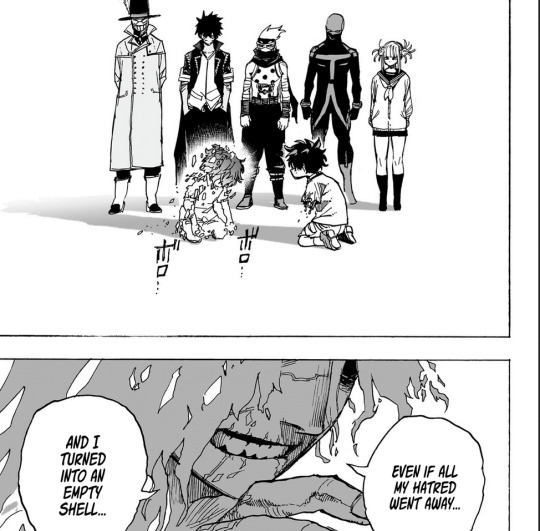
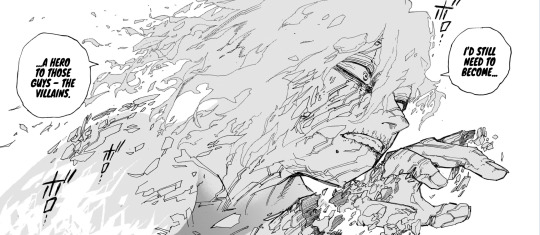
Like, I have heard over and over until now how Tomura doesn't and never did care about the League’s causes or all this systemic stuff he yaps about, he only cares about the trauma of having killed his family with the quirk he was born with. And that's all AFO's fault probably, so once the reveal is done it'd turn out Tenko has no reason to be a villain, since as the cringelord put it, "[Tomura's] never made a single decision of [his] own".
But immediately after learning just how much he cares about being born with Decay, we also learned that his conviction is not so shallow. He truly did and does want to be a hero for the people the system doesn't support & heroes don't save; the unpopular kids, the petty crooks, the complete psychos who no one, not even Deku would give a real chance too. For as much as it messes him up to think about his past; the hatred was just drive, gas in the tank much like Bakugou's attitude or whatever anger Deku reserves for guys like Overhaul or AFO.
And it’s not even just the League either; the entirety of the PLF’s 6-figure membership came around to him, and outside of them we see this chapter a handful of other civilians rooting for him instead of Deku. Heck, even before this chapter we heard mention of people who looked to and supported the League in secret; online and such. Some will call these isolated examples, but who knows how many or how few people there are looking at him as their symbol of hope instead of Deku or Endeavor because they too are desperate for a change the heroes aren't offering.
Redestro once asked what Tomura wants to build. He responded he only wants to destroy. I believe the full truth is that he wants to clear the way to a world for them.

Despite what's claimed by AFO and readers who I feel overstate his impact on Tenko; Tomura really did care about the League, he cared about doing away with the threats to their lives & livelihoods, he wanted to be their hero and save them. Deku can reach his heart but no pretty words about holding hands could ever change that; and this core motivation never had anything to do with AFO.
~~~~~~~~~~~~~~~~~~~~~~~~~~~~~~~~~~~~~~~~~~~~~~~
(I mean, unless it was. Everything else about Tenko was caused by AFO's manipulations in service to him apparently, why not his drive to be a hero for the discarded too? God I hate the direction that reveal is going, have I mentioned that yet? Oh how I hope expectations are subverted there.)
#bnha#shigaraki tomura#shimura tenko#dabi#toga himiko#spinner#mr. compress#twice#jin bubaigawara#league of villains#lov#redestro#paranormal liberation front#PLF#hero society#all for one#midoriya izuku
176 notes
·
View notes
Text
Theres not enough people talking about the Lady Nagant and All Might parallels.

Without Lady Nagant the era of peace would not have existed the same way the other way around aswell.
They were both made to bear the weight of the entire soceity on their shoulders.


As much as I loved lady nagant returning it cannot be denied that she is putting her life at risk here just to save one more life (Izukus but yes) just like Toshinori.
They had both lost hope under the weight of their respective roles. For Toshinori it was after the All For One fight, for Kaina it was after the weight of her sins was to much to bear so she confronted the president leading her to be thrown in tartarus.
And guess who reminded them of their heroic fire, brought back light to their eyes and hope for the future.
Midoriya fucking Izuku
Theres more,
"I smile to show the pressure of heroes and to trick the fear inside of me." Chapter 1.

Because even when Kaina was breaking down on the inside the commissions manufactured smile is still plastered on her face.
Lets not forget they were both majorly injuried by all for one in the scenes where they are limping out of the hospital.
I’d also like to mention about how Kaina at one point was hunting All For One just like Toshinori.
They were also both had replacements, who were able to keep the light in their eyes through all of it because they had someone to look up to.
They lost that fire because they lost (or in Kainas case didnt have) someone to put their faith in, until Midoriya Izuku.
Together Tsutsumi Kaina- Lady Nagant and Yagi Toshinori - All Might are the symbol of peace. Kaina works in the shadows while Toshinori exists in the light both holding up the entirety of hero society.
#bnha#bnha manga spoilers#mha#my hero academia#boku no hero academia#all might#kaina tsutsumi#tsutsumi kaina#lady nagant#yagi toshinori#toshinori yagi#hero society#midoriya izuku#izuku midoriya
809 notes
·
View notes
Text
The Villains (specifically the Lov) Are Right
Especially about the civilians in Bnha
(2 Part Meta Civilians and Lov) (Warning spoilers and long Meta Post) (Permission given to re-blog)
The Lov, specifically the core League of Villains, don’t owe any consideration, atonement or apologies to the civilians in Bnha. Because since long before the Lov had even become villains, even when they were still children, the civilians decided that they don’t owe them anything at all.
Most people I’ve seen in the fandom say something like “I don’t justify or excuse the villain’s actions.”, when it comes to the destructive/murderous parts of the villain’s deeds, which is very nice and moral of them to say.
But as long as we’re talking about the average Bnha civilian, I definitely justify/excuse the Lov’s actions.
Because the “innocent” people in Bnha are awful.
Part 1 The Civilians
That’s not even an opinion really but rather a fact that’s been presented to us clearly, over and over again, in Bnha’s story.
That’s partially why I believe that, even at their worst, the Lov are still worth more than most of the civilians that we’ve been shown so far.
See Past the Labels
“Heroes”, “Villains”, “Innocent People”. All labels that are used frequently over the course of Bnha, but seeing past these, looking beyond what we’re told by the story and instead seeing what we are shown by the story, that’s where the truth is in what these characters are and the effects their actions have on each other.
In Hero stories, saving the innocent/civilians is pretty much a guarantee at any point in time, it’s a prerequisite.
Where in most of those fiction, the civilians (or any large social group of innocents) are shown to definitely be people that should be saved, that it would be a tragedy if even some of them died, no matter the numbers.
But that’s not the case here, because the civilians in bnha aren’t like what you’d normally find in a hero tale, so much so that they’re nearly incomparable to any other series’ “Innocents”.
Looking at them as a whole, they’re more like what you’d find in a horror story.
Starting with one of the largest by the numbers examples:
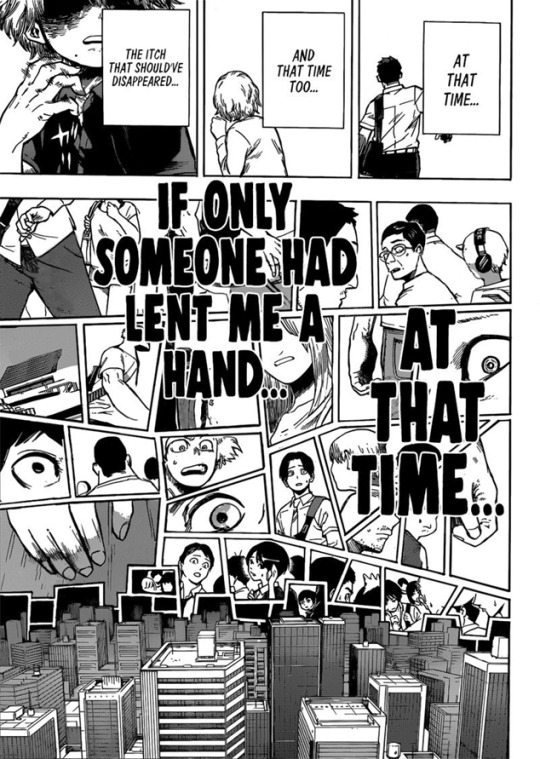
They’re personifications of the bystander effect/syndrome, taken to the highest degree.
A truth that’s sometimes overlooked is that, while All for One and the Shimura family played a part in making Tenko Shimura the Tomura Shigaraki that he is today, so did all the civilians above. If even a single one of them had tried to help the child that would become the most dangerous villain, no matter how that would have turned out, the person Shigaraki is now would be different, maybe entirely.
Even just one true attempt to aid the scary looking child, instead of leaving it to the heroes who weren’t there, would have made a lasting impact. Just like the civilians choosing not to lift a finger to help left a lasting impact on Shigaraki in the present.
They condemn people for things that aren’t their fault, even when the individual hasn’t done anything wrong:
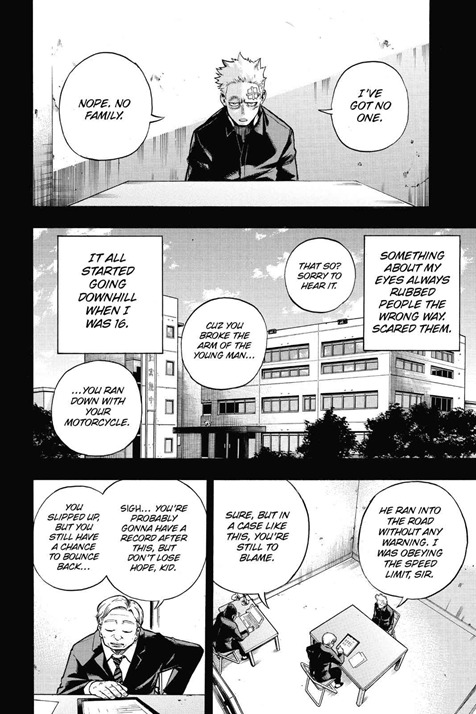
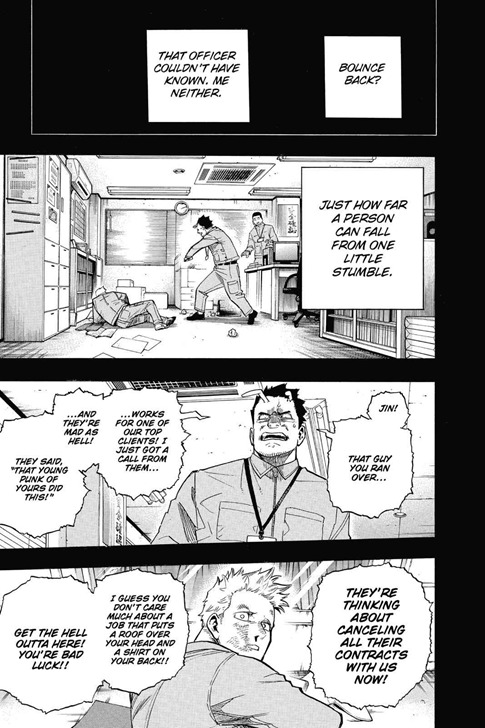
These are pretty self-explanatory in the point, but these aren’t just examples of ‘bad luck’, they showcase a callous legal system and civilians willing to throw a 16 year old kid under the bus for something that was in no way his ‘stumble’ or fault.
(First Side Point: Twice didn’t turn to a life of villainy because it was his “choice”. There’s been zero evidence of any social help for victims of hero society’s circumstances, so there’s no reason to assume that Twice had any help in supporting himself after his parents died. Twice then getting fired from his low level Job and having a glaring blemish on his record (as shown above ^) was a death sentence for a normal life right then and there, especially considering the setting in hero society (Japanese culture taken to its most socially merciless), it doesn’t really need to be spelled out any more than that why he turned to a life of crime against a society that screwed him over at every level and left him to rot. Between becoming a tragic statistic that the hero state didn’t (and still doesn’t) care about or becoming a villain for the chance at having some kind of life, it’s not really a choice at all. The saying ‘Cool motive still Murder’ comes up sometimes when taking about specific villains in Bnha and my response to that would be: ‘Then Suffer and Die Nobly.’ There is no ‘being better’ because if they were better in their current circumstances, they’d just quickly become a statistic.)
They’d rather someone, even their own children; suffer in silence than be seen as anything but their “normal”:
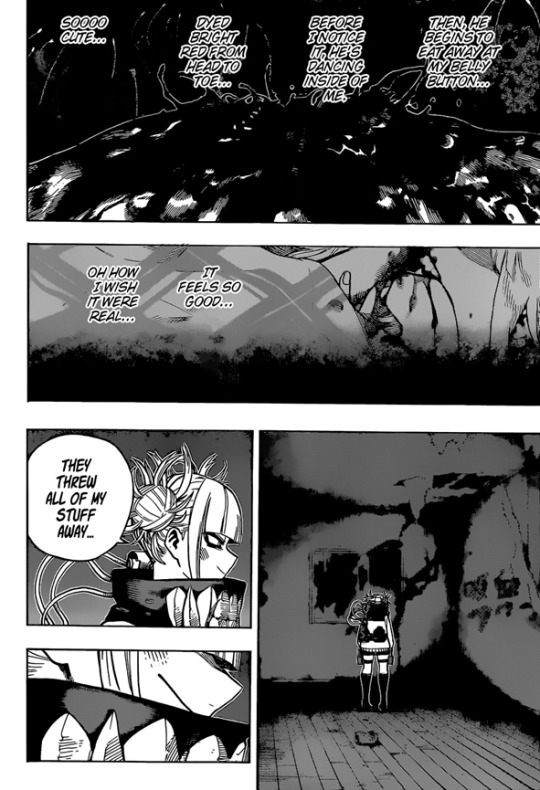
Toga’s parents might seem like a more ‘personal’ point but they’re actually a prime example of the standard bnha civilian, caring nothing about their own suffering young and only about their own lives and normalcy. Even when Toga was obviously self-harming due to her quirk, something that couldn’t logically have been hidden from them, there was no real attempts to help her with this other than rejection (as evident by the parents stopping taking her height down on the wall when her quirk presumably manifested, clearly meant to be a hint that it was the point that they stopped caring about her) and sending her to “Quirk Counseling”, taking no responsibility in helping their child and taking none after Toga was broken under the weight of what was normal after struggling to hold back for so many years.
This mentality extends past Toga’s parents to most of bnha’s civilians.
When Dabi revealed himself as Toya and exposed the Todoroki family’s past the world, nobody cared. At least not in any way that could be considered ‘caring’.
Endeavor bought and bred his wife, and it’s very debatable whether or not the later ‘child making’ could be considered consensual.
Rei told endeavor that it was “too much” and “too cruel”, all but saying that she didn’t want to have any more children, and in the anime it’s played even more clearly:
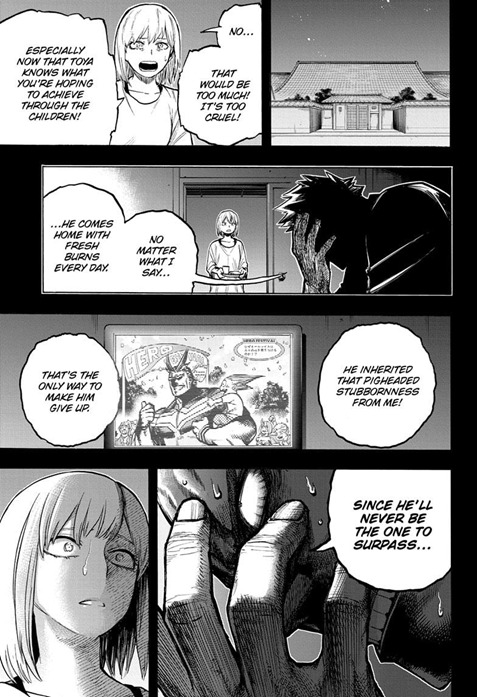

This ^ does not seem like consent.
Also letting his first born son burn himself to his apparent death because he couldn’t be bothered to care enough to prevent it.
Endeavor knew Toya was burning himself and he never got him any psychiatric help, even though Toya was already having extreme signs of mental breaks alongside the burning, he never even thought about it.
Even if this failed in stopping Toya, Endeavor just could have pulled some strings as the number 2 hero and gotten Toya Hero tech/equipment/suits, anything that might have helped.
But all Endeavor did was tell Toya to stop and do “other things” and when that failed he simply ignored him, even though he knew his child was literally burning himself.
(Endeavor could be considered an unreliable narrator, I think other great Meta writers have already called him on that, with him telling Natsuo that he never meant to neglect any of his children, which is evident (by how he treated Toya) as complete Bullshit.)
Now do the civilians know all of this down to a T?
No, but even before the Dabi reveal there was more than enough sketchy events surrounding Endeavor to raise eyebrows on anyone paying attention.
A son burning to death alone on a mountain, another son getting a burn scar on his face and a wife in a Mental Hospital, more than a little suspicious. Nobody ever looked into it.
And after the Dabi reveal, after Endeavor confirmed what Dabi said to everyone, this is the only Civilian backlash he gets:
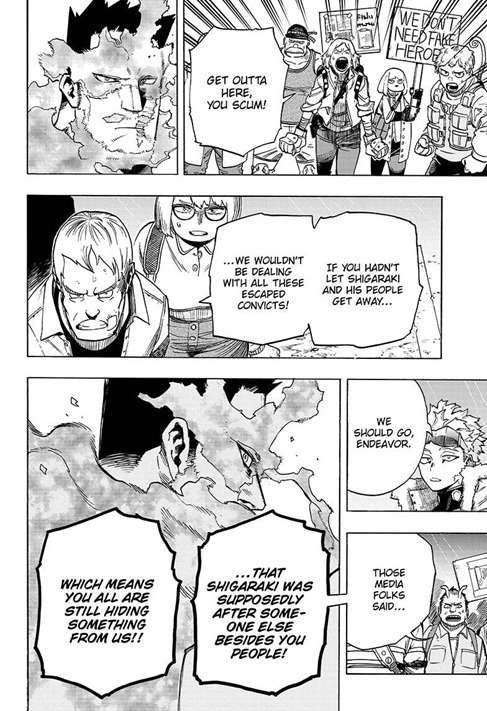
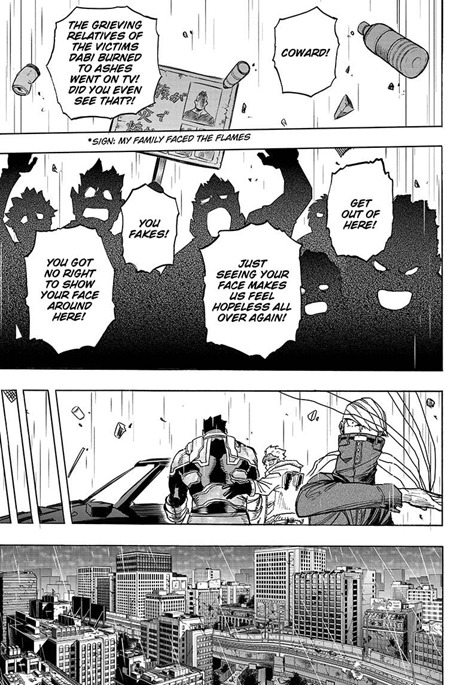
Nobody cared what happened to the Todoroki family; they only cared about how it affected them. The first half of that anger wasn’t even about the Todoroki drama.
And while the mention of Dabi’s victims and their families might seem like consideration, paired alongside everything else the bnha civilians are/do, I really doubt that the line comes from a genuine place of sympathy.
They have no loyalty to their best Heroes:

After everything Deku did for them, they wouldn’t risk a single thing for him. Most of them don’t even look anxious or afraid, just angry at their lives being disrupted.
Telling the kid who nearly worked himself to death, fighting so that they could have their lives back to piss off, while danger sense was being activated implying that they did mean him very real harm.
Another big point against the Civilians that’s brought up a lot:

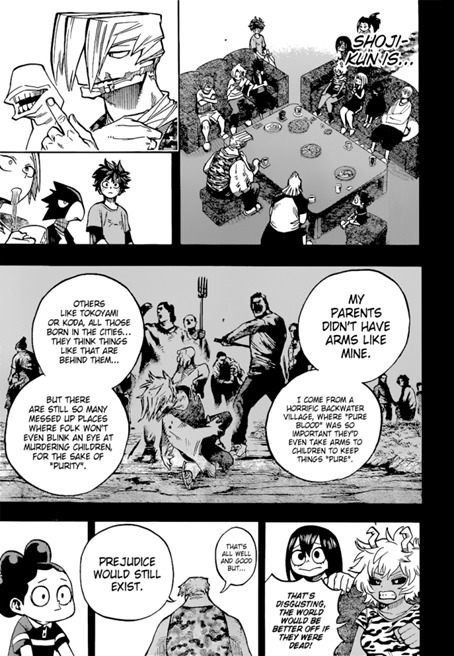
They’re violently racist. (Quirk-ist? Anti-Mutant? Basically against anyone very different in their appearance and/or their quirks.)
Mutants are an obvious Allegory for the racism/minority angle of the story, and it never casts the majority of the civilians in a positive light when it’s touched upon.
(Second Side point: Revisiting the end of ‘Side Point One’ because it pairs perfectly here, Shoji Mezo’s “Answer” to the horrible treatment the Heteromorph/mutants face is the opposite of that, and by that I mean Shoji’s answer is pretty much: Aspects of Uncle Tom’s Cabin Syndrome (an American theory/term but a Universal Theme) mixed with the acceptance of hero martyrdom.
His words to the Heteromorphs are this: “Let’s use that light to change the people who hurt us. So that they’ll feel ashamed to ever raise their fists against us again.”
Very inspiring…or at least it would be, were his words not disproven by his own backstory.
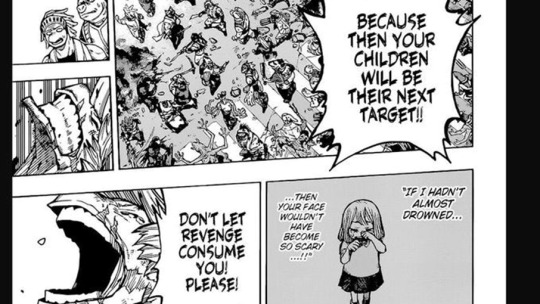
Shoji got his Scars ^ after he saved the little girl, in fact him saving her life was literally the cause of it.
There is no greater way to Shine or be heroic than doing what Shoji did, saving the life of a small child from drowning to death, and for that act the “Innocent People” gave him the Joker facial treatment.
Seriously if there’s a group of people who “don’t deserve to be saved” in Bnha; it is civilians like this.
Yet Shoji’s answer is still to “Be better than mere Avengers” and if they don’t the Heteromorph’s “Children will become the next Target!” as if they weren’t already??
None of it makes sense when looking at the whole picture and it’s clearly not a great plan, to draw another American based parallel that fits too well not to be noticed despite it being American; Shoji Mezo is basically Sturdy Harris from the Boondocks TV Series (freedom ride or die episode).
Look up the character’s wiki info or watch the episode, the fact that Shoji is willing to use violence in some extreme instances might seem a difference between them but the fact that he urges the other Heteromorphs to “be better than avengers” and “use their light to change the people who hurt us until they feel ashamed”, giving no thought as to whether or not his fellow Heteromorphs could even survive living by that standard like he can, fits the comparison to a T.)
Back to the final few points about the Bnha Civilians:
Are the Civilians in Bnha conditioned to be this way, products of influence and circumstance much like the heroes and villains are?
Kind of but not really.
While it is true that there are mountains of propaganda in hero society, there’s nothing specific enough to point to and say that this is why the Bnha civilians are this level of callous. They’re conditioned to love heroes and fear the violent villains they’re fighting, not to ignore the suffering of children (even their own) completely, and they’re definitely not compelled through propaganda to reject them or scar them, nothing in the series is evident of that.
And even worse, all of these examples of the people’s flaws/incidents (excluding the Ordinary Woman Heteromorph) happened during Allmight’s “Era of Peace”, so there’s no shifting the blame onto the villain’s current actions and even less excuse for things like these to be happening.
Why should the Bnha civilians have peace or justice if they’re like this?
If they show no more empathy or loyalty than the worst, most unsympathetic villains in the series (Like AFO) then maybe their point of view shouldn’t be considered any more than his. (And even AFO had some truth in his points: Failed social framework and the Quirk Singularity.)
To draw one final example for the Civilians with another Manga series that has pretty awful ‘ordinary people’ in it: Naruto.
But even in Naruto, the Author still showed that there were good people among the Civs. Population that weren’t like that and that did deserve to be protected and live peaceful lives, people who were outside of the Ninja system and just genuinely humane.

Before Naruto became a hero who saved the village multiple times, before he was even a ninja, they treated him like the human child he was.
These characters deserve their own Meta, other Naruto fans have probably written them already.
But suffice to say that the people who treated right the abandoned and hated child, host to a demon Fox that could casually level mountains, Teuchi Ramen (Owner and Daughter), are an excellent example of giving narrative motivation to “protect the people”.
There’s not much of anything like that in Bnha’s story, not anyone to point at and say; “They are worth saving/protecting!” and having it actually be true instead of just ‘What the hero is supposed to say’.
And if anyone disagrees with this, I’ll ask: Can one instance of goodwill be pointed to for the Bnha civilians? Any act of compassion, bravery or selflessness from someone in Bnha who wasn’t in anyway associated with heroes?
And no, the Civilians letting Deku stay at UA does not count.
It wasn’t even framed as selfless or compassionate anyway:

This ^ is a deal more than anything else.
Because the heroes (Deku) swore they’d fix things and the people practically made him swear it before they were let in.
Kota and the Ordinary Woman running to stand by Deku was a sweet and great moment but considering that he saved them first, it seemed more like a ‘returning the Favor’ sentiment. Same with the rogue Civillian group helping Shindo after he fought Muscular, more a give it back than a gift.
Part 2 The Lov
Even at their worst, the Lov still display humanity and redeeming qualities more than most of the civilians.
And I believe that this is 100% truth because Actions/Dialogue without reason for deception and inner thoughts, imply genuine Truth.
Actions:
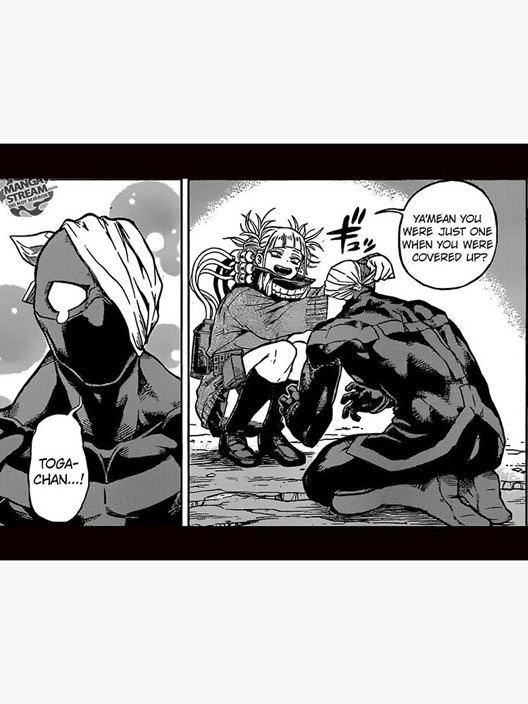
This ^ scene is referred back to a lot because it’s a good showing of Compassion/Bonds, one of the first really, in the League of Villains, in Toga saving Twice from ‘coming apart’.
Toga has no real reason to comfort Twice as much as she does in this series, in this first instance and in later ones, because aside from one time (no matter how cool and heartfelt it was) in MVA when Twice saves her and the rest of the League, Twice kind of messed things up more than a few times for the Lov.
Bringing Overhaul to meet the Lov without precaution resulting in the death of Magne (even though she herself rushed in recklessly), Twice’s personal hang-ups limiting his Quirk lessening his value to operations overall (from a purely strategic standpoint), and trusting Hawks (because he felt bad for him) so much he gave out Info that definitely shouldn’t have been given.
Yet despite having one singular success in MVA that Twice really pulled through among many other shortcomings, Toga still cared about him. Enough to try to help him hold himself together during the Overhaul business and then later go on a violent, rage filled assault toward the Heroes during the MLA raid after Twice was killed, giving little thought to her own safety.
Dialogue without reason for deception:
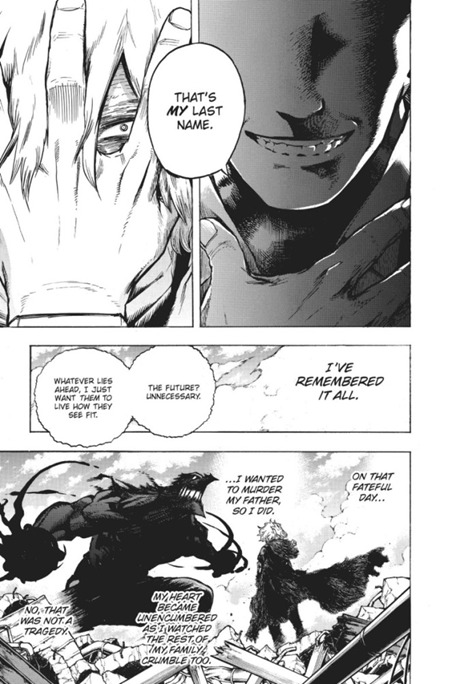
While Shigaraki is definitely an unreliable narrator, as evident by the monologue ^ in the bottom panel clearly contradicting what actually happened during the death of his family, the middle panel where he states that he only wants “Them” (definitely the Lov) to live as they see fit seems like the truth.
Because why would Shigaraki lie here? In this time or place to Redestro, someone he presently had no reason to manipulate, as they were in a life or death fight?
Shigaraki couldn’t have known Redestro would surrender, at this point he was talking to someone he fully intended to kill, further dissipating any suspect of manipulation.
Shigaraki does care about his comrades, their wishes and while he hasn’t really kept the promise he made as of current Bnha, I think that’s a result of All for One scrambling his Brain so much during the Mental Fusion stuff, the true Shigaraki barely seeming to know what’s going on half the time and only able to think about his past.
Twice and Spinner: Basically everything about them.
They might not think things through that much, but there’s no doubt that Twice and Spinner were and still are devoted to who they care about, true loyalty in all its successes and faults.
Inner Thoughts:
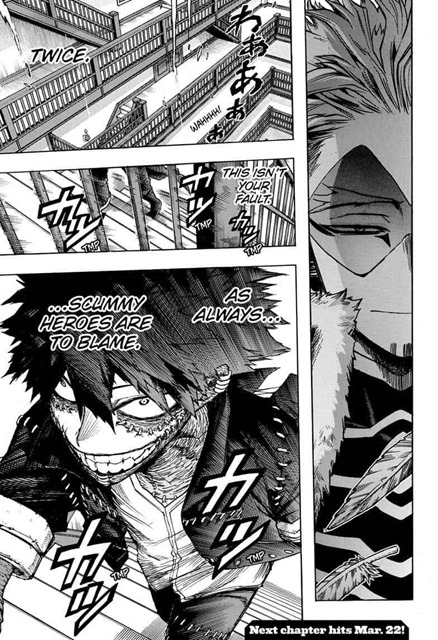
Dabi is…kind of a dick most of the time, even to the Lov, just to a much lesser extent than to everyone else.
It makes sense that he’d act that way though, given what he’s been through and the end goal of his plans, it’s understandable why he’d want to push everyone away in some form and not let them get too close.
But even underneath all of that, Dabi much like the rest of the core Lov never blamed Twice for his mistakes, and since this is an inner thought and thus having no reason for manipulation, it does imply that this is his honest truth.
Knowing that Twice would blame himself, although he never said it out loud, maybe he couldn’t with all of his own personal hang-ups, Dabi inside probably did want to reassure Twice that none of this was his fault.
The Core Lov do have empathy towards others abandoned and hurt by Hero Society like themselves, and they do care about each other, that is as much as they’re able to care about each other while being weighed on by their own individual issues.
The hero kid’s parents
Lastly for this Meta, there are parts of Hero Society that shouldn’t ever be destroyed, but they fall into small groups and come with their own faults.
The Hero Kid’s parents shouldn’t be destroyed just by virtue of being so close to the better/more heroic characters, but even they aren’t that great with possibly one exception.
Inko Midoriya has technically tried to protect Izuku but she never really helped him. She basically apologies for his existence in the childhood flashback, and until Izuku got a Quirk and became a Hero, she was never really shown to encourage him in anything, even to find happiness in other things.
Despite having doubts herself about saying the wrong thing to her son, Inko later tries to keep him from going back to UA for very good reason from a parent’s point of view.
But then she’s pretty easily convinced by a promise from Allmight, that wasn’t in anyway kept. Cut to the Dark Deku stuff later, she never calls Allmight out on this.
It’s the same story with little difference for all the student’s parents, they’ve never been shown to try to protect their children, especially at the UA confrontation with the Civilian Mob.
Inko, Bakugo’s parents, Ochako’s parents, and I’m just assuming the rest of them to cause it makes sense for them to be at the UA shelter, none of them helped.
I know Inko was being held back by Mitsuki because it was dangerous, but couldn’t she have shaken her off?
Kota did and ran to Deku to try to help him, and he was a little kid being held back Pixiebob (a Hero).
That probably wasn’t what Hori was going for or implying but that’s what happened.
Is this an illogical thought process that would be dangerous or harmful for the parents? Definitely.
But that’s the point. The parental instinct that goes beyond self-preservation and logic to protect their children hasn’t been shown for any of them.
Except one.
*Current Spoiler Warning*
Rei Todoroki in the recent chapter stands apart and above in this aspect, although this depends very much on how it’s framed going forward.
A mother fighting to stop her child from killing himself more than trying to stop a Villain from killing. Both true but one has to take front over the other for it to be meaningful, for Rei to show that she will stop Touya from burning himself this time, unlike how she wouldn’t before.
That’s character development, that’s parental instinct.
*Very current Spoilers*
Rei is there for Touya :) trying to save her son…and also Endeavor maybe?
Close enough (Double Thumbs UP!)
The children
Another group that definitely should never destroyed is the Young Children of Bnha, Kota, Eri, the work studies Kid group.
I put them into a separate category than the whole of the Civilians but it would take a lot to explain why that is and why they can be viewed as their own separate group, so I’ll put it in the next Meta and expand on how they relate to the existential parts of Bnha.
Also same for the villains/heroes and finally getting to the Quirk Singularity Theory.
To be Continued…
#bnha#bnha meta#mha meta#hero society#league of villains#lov#shigaraki tomura#toga himiko#dabi#jin bubaigawara#spinner#mha
309 notes
·
View notes
Text

This should have been another wake up call for hero society to change course. It's not a focus (outside of Vigilantes and BNHA's final arc), but it's canon that All for One targets those on the other side of the law the most because they're easier targets since they're not good victims, so heroes don't bother to protect them.
The BNHA police at a minimum just learned that a man was likely turned braindead against his will by All for One. But how All for One got ahold of this person and how to prevent it from happening to others were never considered; he's just a petty criminal after all.
#bnha reread#bnha 47#bnha#tsukauchi naomasa#i'm always a bit disturbed by how little characters are affected by the concept of the nomu#not oh that's scary looking but like the horror of that used to be a person and they've had all agency robbed from them#like the only time we ever get that is with kurogiri - but unlike most nomu he was an aspiring hero (toga had a point)#hero society#all for one
66 notes
·
View notes
Note
hey i recently found your work and love your writing. Can you write something about a supervillain dad and a hero son??
“Hands up,” the super villain motioned with his gun, face impassive. The hero swallowed as he complied.
“You won’t shoot me,” the hero said, but it was too hesitant to come out as confident as he wanted it to.
His dad raised a brow. “Won’t I?”
The hero sucked in a breath. Held it in for three. Out for three.
“Do it, then.” He was proud of how steady his voice was. “Shoot your only kid.”
“You say that like being my child means something.”
“If it didn’t, I’d be dead already, dad.”
His father’s face was weary, but the gun didn’t lower.
“I’ve let you have your heroics. I’ve been very generous, actually. Do you know how many plans you’ve fucked up? Plans I gave permission for?” The hero didn’t respond. “It ends, now.”
The hero steeled himself.
“No.”
His dad lowered the gun, but he suspected it was more out of surprise than anything else.
“No?”
“No,” the hero repeated more firmly. “You heard me. I know you did.”
“I heard you,” his dad agreed. “I was giving you the chance to change your answer.”
The hero grit his jaw, shoulders set.
“It won’t change.”
His father sighed, rubbing a hand over his brow.
“Why must you make things so difficult?”
“I’m sorry my morals are getting in the way of your hobbies,” he snarled. “Here, let me move out of the way of your most recent murder attempt.”
“Don’t take that tone with me,” his father snapped. “Have you forgotten that you’re my most recent murder attempt?”
“How could I?” He scoffed. “Kind of hard to ignore my father’s attempts on my life.”
“And yet you still insist on playing hero—”
“Because it is the right thing to do,” the hero interrupted, hands clenched. “And I will never stop trying to do the right thing so long as you are doing all the wrong ones.”
His father looked like he didn’t have a clue what to say to that.
They sat in silence.
“Does family mean nothing to you?” His father said finally.
“Family is not an excuse for bloodlust.”
“Your mother—”
“Do not.” His gaze darkened, and his father shifted uncomfortably. “She is not a scapegoat for your actions.”
“She died—”
“And how many mothers have you killed trying to soothe the pain of her death?”
His father lowered the gun.
“I will not let my son continue to play hero. It is a sign of weakness, to have you out here undermining me. I won’t tolerate it.”
He realized, then, that there was only path out of this moment. There was one solution. One chance.
“Whoever you are, you are not my father.” The blow struck true. His father flinched. “And if that’s the case, if the choice is being your son or being a hero, then here’s your answer.”
Power began to crackle up his arms, reflected in his father eyes.
“It’s a shame, dad,” the hero said, eyes glinting. “You lost your only son, and you didn’t even have to kill him to do it.”
The supervillain paused, for a second, just one, pain flashing across his face, before he raised the gun once more.
This time, the supervillain didn’t hesitate before he fired. Didn’t bother to watch if the hero got out of the way in time.
The supervillain would never kill his son.
But if his son—the hero. But if the hero had decided he would rather be dead than family?
Well, who was the supervillain to deny him that?
#writing#writing community#creative writing#snippet#heroes and villains#angst#ficlet#writblr#supervillain dad#hero son#hero society#bad parenting#father son#writing ask#thank you so much for the ask!!!!!#I truly appreciate it#the broken pen#bad father#hurt/no comfort#fic writing#thank you so much for the ask anon#I appreciate y’all so much genuinely
30 notes
·
View notes
Note
speaking of toga look what leaked tonight
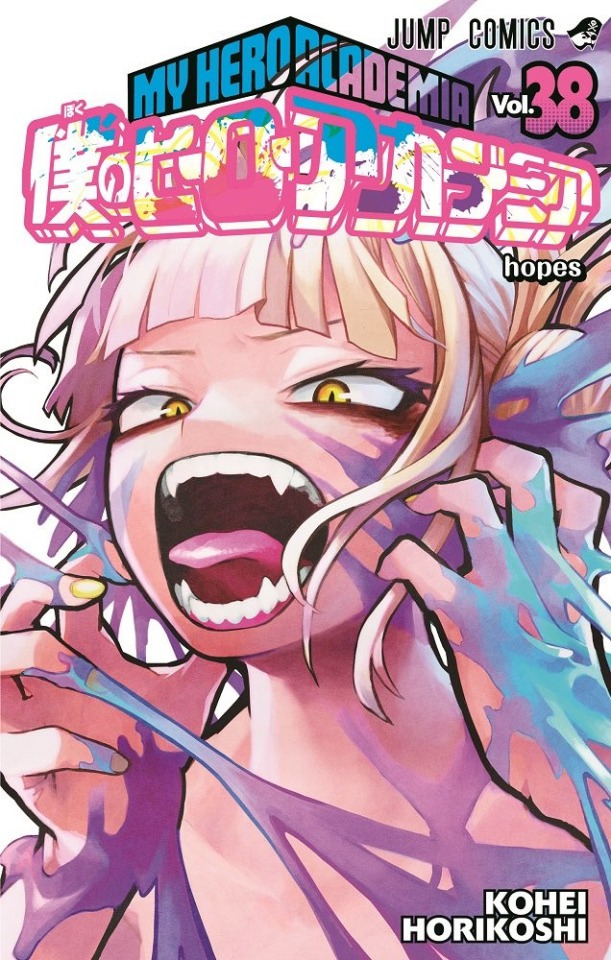

AHHHHHHHHHHHHHHHHHHHHHH
#SHES WEARING TWICES COSTUME GRRRRRRRRAAAAAH#or like his body whatever#these are sick as fuck#i kinda cant say this cause i dont really read/watch anymore so idk whats goin on but damn i wish bnha had a broader focus on the issues of#hero society#the chapter where toga/ochaco have That One Encounter where toga runs away crying. life changing to me#like the stories not reeeeally abt that and it does touch on it with shigaraki with toga with dabi with shouto/endeavor (w hawks i think?)#but its not enough like so close to being something for me but its not hitting a specific mark *biting biting biting* anyways#toga + ochako as foils slays#< u can leave the bnha but the bnha does not leave u#asks#sistervirtue#mutuals!#bnha leaks#bnha spoilers#ig
97 notes
·
View notes
Text
Why don't more crossover fics have Peter as a vigilante in the world of MY Hero Academia? Peter would never support a system where heroes are commercialised and ranking high on a leaderboard is more important than helping people.
At the very least, if you want to make him a student have him be reluctant about it or have him confront his teachers about the errors of their society.
#marvel#peter parker#spider man#spiderman#my hero academia#mha#boku no hero academia#bnha#hero society#vigilantism#u.a. high school#crossover#marvel crossover#mha crossover
26 notes
·
View notes
Text
wait, do people who read bnha realize that there's no such thing as 'quirk suppressants' or 'quirk-cancelling' handcuffs/drugs/etc. in the HeroAca World currently? There's nothing. There's only Eraserhead and heavy sedatives to stop a person's conscious altogether (and formerly Overhaul's bullets that were the first of its kind).
Like, that's the reason for why Heroes are allowed to use heavy force, and why Tartarus and it's straightjackets are a thing? A good part of the conflict hinges on the fact that the world can't easily take away a person's supernatural ability - that's why quirk use is so suppressed and Villains are treated so harshly and no one had any idea what to do with kids like Toga or Eri (before being taken in by UA/Eraserhead) who couldn't control their quirks besides telling them to not do it, or that they're bad for not controlling themselves, and finally abandoning them.
When you have no good way to inhibit someone's quirk with a simple injection or electronic collar, you'd end up trying to prevent them from using their quirk in whatever physical way possible: restrain them by tying up their arms or putting a muzzle on them, lock their hands in metal boxes, put them in a confined space with a gun trained on them, keep them under anesthesia for months on end, and so on. You end up treating them like they're feral, rabid beasts that can't be controlled, as ticking time bombs monsters who are capable of any thing at any moment and needs to be subdued as quickly and completely as possible.
#nalslastworkingbraincell#worldbuilding#Hero Society#Quirk Society#bnha society#HeroAca World#unfortunately they live in a quirky society#Horikoshi never reveals this explicitly#which I think is pretty cool as a thing for the reader to eventually realize#but it does get missed often
592 notes
·
View notes
Text
Does anyone ever wonder what happened to the villain Mustard. Cause like the UA Traitor got like no consequence(that I know of) but this 15 yr might be in a prison for life or something-
#makes me wonder if redemption is only for like the ‘hero’ like characters that got help#rest were just abandoned or something#bnha#league of villains#mustard#boku no hero acedamia#villain mustard#bnha mustard#my hero academia#aoyama yuuga#bnha aoyama#ua traitor#mha midoriya#hero society#corrupt hero society
51 notes
·
View notes
Text
More and More on Mina, Machia and the MLA
For my readers other than @randomvongenerico, please have this peremptory list of this very lengthy post's contents to help gauge your interest:
Some more discussion on what is or isn’t, would or wouldn’t be blameworthy about various characters’ actions (or hypothetical actions) during the war arcs.
More discussion about Mina, chiefly about how (and why) her acid powers are handled compared to all the male characters with fire powers, and the way her plot points are poorly set up by the narrative, with the result of shortchanging her development.
Yet More Complaining About How The Story Is Handling Heteromorphobia, this time featuring a compare and contrast on quirk-based bias as it might affect Mina, Bakugou and Tokoyami, as well as a dissection of Shouji’s contention that the only possible way to know about the violent bigotry in the rural areas of the country is to be from them.
Some fairly extensive spitballing in response to questions about how I would have handled the scene at Machia’s prison compound if I were writing it, as well as why I have trouble conceiving of anything Hero Society could do to Hose Face for killing Midnight that would actually feel like justice.
A little bit of basic talk about Tumblr, its functionality and some relevant slang.
Buried at the very bottom, I stand up in front of God and everyone and explain in brief why Kaminari is a worse character than Mineta, with some particular focus on Kaminari as emblematic of the conflict between what the series tells us versus what it shows us about the legality of quirk use in careers other than heroism.
Hi again, rvg. Because it's been forever since our last post exchange, let me say again that I appreciate the apology and want to thank you for being such a good sport about it. Last time I had something like your initial response, that person told me straight out that they’d been condescending and antagonistic on purpose, though they regretted having done so after my reply. I appreciated the regret, but would have preferred they take a day or two to cool off in the first place! That’s the experience I was bringing to your comments, but I’ll keep in mind what you said about lack of experience with initiating chats and Tumblr in general.
For what it’s worth, yeah, there is a character limit on both asks and replies, so that’s the trouble you were running into there! You might also consider using a cut next time before a really long post, though if you’re on mobile, I recall that being a difficult-if-not-impossible feature to find, and it’s not as important as it used to be ever since Tumblr’s started adding default Expand drop-downs on long posts. That aside, welcome (belatedly) to Tumblr! I hope you find some good people to chat fandom with; I’m always open to some back and forth about things I know well enough to talk about, though I’m, er, decidedly unprompt with replies. And, as noted, definitely more of a villain fan, so probably not the most fun person for discussions on the kids.
That said, to your replies! Other readers should note that, while I wrote all this roughly in response-order to rvg’s points, I reorganized everything after the fact to group together the broad topics. I’ve tried to provide some bare minimum context for anything that would otherwise be too much of a zero-context non-sequitur, but if anyone wants to see rvg’s comments in their intended order and context, their reblog can be found here. Otherwise, hit the jump!
Would You Have Held It Against ___?
But would you hold it against Mina if she had actually done more substancial damage to Machia? Let’s say, not the face, but Machia’s fingers instead of his claws. Machia still doens’t feel any pain. Would you chastise Mina for it? Even though she’s actively saving Mt Lady by doing that?
It’s hard to say for sure, since I imagine that if Mina’s acid had hit Machia’s fingers instead of his claws, we probably would just have seen them abraded and singed, like how Dabi’s fire damage was drawn on Hawks, not with chunks of skin melting off and exposing naked bone. Physical damage in BNHA just doesn’t work like that, at least not against named characters. If Mina were doing realistic damage, I imagine everyone else would be too, and then I’d be criticizing all of them, because, holy shit, that is not okay to do to people, any people, and especially not when you’re acting as an agent of the state.
But hypothetically, no, I think I would be more lenient even if she did do concrete and permanent damage to Machia’s hands, and it’s because she’d be doing it to save Mount Lady. Shinsou could have taken control of Machia and then just had him lie still while whoever was in charge of this facility redrugged him,[1] and that would have been fine by me—disappointing, sure, but only because Machia’s interesting and I’d like to get more on him than we do, not because I’d be critiquing Shinsou’s actions.
It’s specifically Shinsou and the rest choosing to weaponize Machia against AFO that I object to. Mina harming Machia would be taking that action herself, to protect someone that’s right in front of her, risking no one’s life but her own in doing so. Shinsou throwing Machia up against AFO—which he’d made the decision to do before hearing Machia’s angry grumbling—is risking Machia’s life, without Machia’s consent. And it’s not even for the sake of saving anyone, at least not anyone that’s right there in that moment—AFO is fleeing.
Sure, he still presents a huge threat to lots of people, but given that we’d just seen proof that AFO did not know about Shinsou’s power,[2] they could also have used Machia to, for example, rapidly transport the heroes to some place they could set up a second ambush to trick AFO into responding to Shinsou. I mean, good god, AFO’s the chattiest villain in the comic; Hawks lured him into at least two extended conversations even after he’d resolved that he needed to leave. He’s a Demon Lord and thus categorically incapable of shutting up. And that would have been that, really. Take control and let the clock run out; end of problem.
It would have been anticlimactic as hell, so obviously that was never going to happen, but there’s no reason the heroes couldn’t try for it, you know? Instead of the bone-headed decision to just hand AFO his most loyal soldier on a silver platter on the thin chances that they could either prevent the brainwashing from being broken at all or that Machia’s upset would translate to both the capability and willingness to attack his master.
I’ve observed this problem in a few different areas, that Horikoshi sometimes writes the heroes, particularly Hawks, as not taking actions or drawing conclusions that, from their perspective, should seem sensible, well-reasoned, and with solid chances of success; instead, they simply disregard possibilities they should logically be considering but which the reader knows are dead ends, or they benefit from things they could not have known at the time they acted. That hurts immersion because it gives the heroes victories, both tactical and moral, that they simply haven’t earned. Shinsou’s control of Machia is a particularly egregious example.
Speaking of Monoma. Since we were talking about the morality of Shinso’s Quirk. Would you say Monoma using his Quirk to copy a villain’s Quirk and use it on him and his allies, would also qualify as something that should be criticized? I’m curious.
Nah, I don’t think so. Taking an opponent’s weapon and using it to subdue him is a perfectly valid tactic, especially since Monoma’s method doesn’t actually deprive his opponent of their weapon, just replicates it for his own use. It really all does boil down to Shinsou’s method forcing people to fight and hurt their own allies. Mina causing Machia physical harm, Monoma using a villain’s own weapon against them, even the heroes’ surprise attack: none of those are remotely on the same “holy shit that is a literal war crime” level as what the heroes planned in advance to have Shinsou do to Machia, and what he willingly agreed to do well before he found out that Machia was not as opposed as the heroes thought.
I mean, I get what you’re getting at. I’m just wondering. If the heroes hadn’t launched a suprise attack, and had left the villains do the first move and come to them, would you then be criticizing them for being irresponsible and incompetent instead?
Sorry for going on a tangent, it’s just something I’ve noticed when it comes to readers criticizing the heroes. It’s either people complaining that the heroes are too ruthless, or that they’re too nice, naive or not pragmatic enough.
(This is in response to some discussion of the heroes' actions in the first war arc's raid on the villa+hospital lab, not the second war's divide and conquer plan.)
I actually don’t really have a huge problem with the surprise attack in principle—I might criticize Cementoss ripping the building in half when there could well have been people on those upper floors, but otherwise, it’s hard to imagine what else the heroes could generally have done to deal with the numbers they were dealing with. I mean, it’s basically just a scaled-up version of the attack on the Hassaikai base, and I don’t have any moral quibbles with the way the heroes and police handled that.
Rather, my problem with the raid is that I thought the heroes were too effective given the way their forces and those of the PLF had been set up. It’s not the tactic itself that’s the problem (though individual acts of worse violence within the attack, like Hawks killing Twice or the attempts to outright murder Shigaraki in the tube, are still an issue), it’s the finality, the totality, of how effective the attack was.
To be brief about it (because I’ve talked about this at length elsewhere), I don’t think the heroes should have known where all the PLF bases were, I don’t think they should have been as effective in disordered mass combat as the PLF, I think the advisors should have put up a better fight in all cases, and I think there should have been enough members of the PLF in significant positions of influence or power that the HPSC couldn’t uncover them all, leading to complications when those members realized their organization was under attack.
As it is, the heroes handily win every fight they have with the sole exception of Gigantomachia and Shigaraki. The PLF is neatly swept off the table save for a few “remnants,” with no attention given to the practical difficulties of detaining tens of thousands of combatants with no motivation to let themselves be quietly arrested, much less how the justice system is going to handle trying and sentencing them all. That has repercussions going forward, as well: heroes clearing the board of all the (named) PLF members save Skeptic leaves the bulk of villain forces in the subsequent arcs to be prison escapees, and man, if the PLF’s moral nuance has been squandered, the depiction of the prison escapees is even worse.
The raid is, of course, only the first of two big surprise attacks the heroes manage. I have significantly more issues with the second one, but most of that boils down to the fact that the divide and conquer/Tempt and Trap plan feels crueler, meaner, and much more openly aimed at extrajudicial murder. And like, that would all be fine and in-character for Hero Society in general and Hawks, the main planner, specifically, but with Deku, Shouto and Uraraka all starting to think Save Villains thoughts, and fresh off the traitor reveal, the kids should never have been as collectively okay with the second war’s tactics as the story has presented them as being. To echo an older complaint, good god, what universe is Horikoshi living in that he thinks the people that converted a place of learning into an arena they call a “coffin in the sky” are the heroes?
I was under the impression Midnight was off to the side from where the MLA minions were passing by, and the Skull Mask guy took a detour to kill her.
I’m not sure from this if you’re explaining how you read Hose Face’s attack on Midnight at the time, or if you’re maintaining that that’s an accurate read, so just to clarify, here are the panels in question:
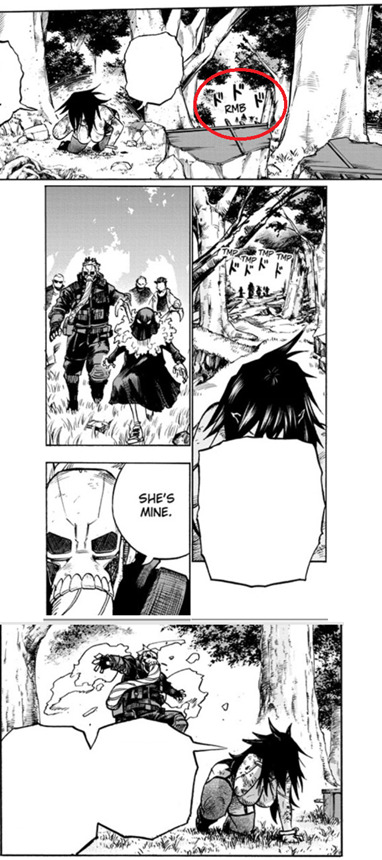
As you can see, the PLF guys’ path through the woods has them coming in from directly behind Midnight. Hose Face calls out that he’ll take care of her once they get close enough for the reader to make out who they are, at which point he gets out in front of Scarecrow and hits Midnight from the same direction as their initial approach: directly behind. He most certainly doesn’t take a detour of any kind, but rather chooses the action that is going to get his group through the obstacle with the least amount of time and effort possible—entirely his prerogative as the highest-ranked member of the Guerilla Warfare regiment on-scene.
But if we classify this entire conflict as a war, wouldn’t that mean that both sides are free to use whatever tacticts and methods they feel like as long as it’s not a war crime?
If we classify it as war is irrelevant if the side aligned with the current ruling authority hasn’t done so themselves. I imagine the Japanese government is in no hurry to validate the terrorists on an international stage by acknowledging that they’re numerous and dangerous enough to declare actual, formal war against! Calling it a war drags in a whole pile of wartime conventions Japan has signed numerous treaties about; it grants the opposing side some legitimacy as a cohesive, organized force that will need to be negotiated with down the line. As long as you’re calling it a police action, you don’t have to negotiate shit until you get to the plea deals! Team Hero never declared war here, so yeah, I still expect them to carry out their plans and actions accordingly.
Also, in the thematic/meta sense, I expect the heroes to either conduct themselves as heroes—admirable, upright, heroic—or face the narrative consequences when they fail to live up to that ideal. The hyper-encapsulated version of this conundrum is the recurring idea that attacking Shigaraki never actually prevents Shigaraki from coming back worse and more dangerous next time; the heroes are never going to achieve a different result by attacking him again but harder this time, and that’s why Deku is set up to finally try something different.[3] I would just like it if what’s true on the micro-level could even be attempted on the macro-level. Or, in other words, if the narrative is going to tell us that saving villains is the correct path, it can’t only demonstrate that for the villains with known-to-the-heroes sympathetic backstories.
General Mina Points
Regarding your analysis about Mina’s acid being underpowered because it’s harder/less believable to downplay the effects of acid than fire/explosions/etc. in Shounen Damage Logic, I think we’ll have to agree to disagree. I don’t see anything wrong with just showing the Nebulous Abrasion Damage that’s the ubiquitous, default mode of illustrating nonspecific injury in this comic for Mina’s acid the same way we get it for the boys.
I can see your argument, but like, just for example, when Endeavor first encounters a Noumu, he bathes it in fire under the assumption that it’s a normal villain and then says he’s surprised it’s still up because he’s never seen anyone stay conscious after that attack. Bathing someone in flames in real life is not a “knock them out” kind of attack; it’s a “severe burn ward for months” kind of attack. If Endeavor’s been throwing that around at random criminals for thirty years, we are plainly very far away from realistic damage, and I’d be perfectly satisfied with treating Mina’s acid the same way.
If I had to take a guess as to why Horikoshi’s so staunchly avoided letting Mina cut loose—other than regressive gender politics—I’d say it’s that acid simply feels nastier or more morally dubious than fire. Fire has positive as well as negative connotations; acid’s a lot more, shall we say, unilateral in the collective imagination, especially given what’s going to turn up if you run a web search for “acid attacks.”
To look at it in JRPG logic (and I don’t care if AFO’s admiration stems from a comic; that comic was clearly playing with Dragon Quest tropes), acid is pretty much the same thing as poison, and poison effects are chiefly the realm of enemy characters. It smacks of underhandedness or cowardice in anything more cognizant than roving toxic plants or venomous beasts. Certainly you see the occasional party member specialized for status effects who can inflict poison damage on enemies, but I can’t readily think of a main character that does.[4]
Perhaps, then, because readers are somewhat conditioned to think of acid as particularly dangerous and nasty compared to fire, and because there’s a limit to how morally dubious Horikoshi is willing to (consciously) write the students, especially the girls, Mina’s sharply limited in how she’s allowed to use her acid.
That said, I got a very hearty laugh from, “Just look at Dabi. He can’t even kill himself with fire,” so thank you very much for that.
It’s as if Horikoshi only ever figures out what to do with Mina retroactively instead of in the moment (e.g. there were no interactions between Kirishima and Mina until AFTER Kirishima’s backstory, we never got any hint that would connect Mina’s and Midnight’s characters until AFTER Midnight died, when Mina speaks about not giving in to vengeance she references SHOJI’S WORDS which happened in HIS FLASHBACK, and then this whole chapter is technically a flashback too when you think about it).
That’s a big oof, all right. I know about the Midnight non-connection and the issue of Mina’s anti-vengeance words having first been delivered by Shouji and relayed to the audience by Koda (it being his flashback, rather than Shouji’s), but I didn’t know there was no indication of Kiri-Mina connection until after his flashback. Wowzers.
But also, in one of my comments I had left a link to a post analizing Kirishima’s and Mina’s characters and their dynamic. I don’t know if you checked it out or not, but it was a pretty interesting read. If you did read it, let me know your thoughts on it.
Apologies for not responding to that; I hadn't clicked it because I just wasn't terribly interested in the topic. Having checked it now, I can say that I'm unlikely to read it because I've encountered this person's meta before and, even at a glance, found it to be flawed for reasons I am not comfortable gabbing about in a public space. I'm sure they make some valid points, but I will have to respectfully bow out of reading and commenting on it here.
But what about Mina telling Kirishima that “now they’re even” though?
(This is re: my contention that Mina saves Shinsou, not Kirishima, from the Sludge Villain, and that Kirishima was never in any danger from the Sludge Villain.)
I mean, she can say it, but that doesn’t mean I have to believe that she/Horikoshi are accurately portraying the stakes involved.
Just for the record, you’re not saying that Mina not giving in to revenge isn’t noble in and of itself. What she does is indeed good. You’re saying it doesn’t have any emotional weight because Mina has always been a morally good character, so you never thought she would ever give in to revenge in the first place. Correct?
Correct! As I’ve said, Mina has perfectly healthy emotional regulation: when she experiences negative emotions like anger, guilt, or grief, she doesn’t dwell on them; she vents them to friends and finds healthy ways to channel them into bettering herself and the world and people around her. She’s got a great head on her shoulders! But all of that means that her giving into anger about Midnight’s death was never a remotely convincing threat to me. Of course she wouldn’t; there’s never been a moment that foreshadowed that she was in the slightest danger of harboring that kind of obsessive, vindictive grudge.
That being the case, it feels unfair of Horikoshi to pin a big dramatic monologue on a desire for revenge which Mina was never shown to possess to any greater degree than any of her classmates. She’s one of the last hero-aligned characters I’d have guessed if you’d asked me who was going to get a beat like that in the endgame.
(To anticipate the obvious question, Aizawa would have been my first guess; he’s even been written for it properly in the way he and Mic have responded to Shigaraki—clearly holding a grudge for something that would have happened to their classmate when Shigaraki was all of six years old. Conversely, while plenty of the 1-A kids could have believably carried a “struggling with vengefulness” plot if they’d been written with it from earlier on, I don’t think there’s a single one of them who feels like a good match for it in their current incarnations. Iida’s moved on from his Stain days too smoothly to buy it from him, Bakugou’s only real obsession is Deku, and Deku already had a whole arc of being obsessively negative and driven by dark desires to find and deal with a villain. If any student was going to show up to the fight with bloody-minded revenge on the brain, it should have been Shishikura.)
But What About the Heteromorphobia, Tho’?
(Warning: Incoming off-topic harping about Shouji and the inane resolution of the hospital attack.)
I have even seen someone make a post on Reddit arguing that Shinso being discriminated for his Quirk makes no sense because it’s not villanous, and that it makes more sense for characters like Bakugo, Mina and Tokoyami to be discriminated because they have more villanous looking Quirks.
I don’t really agree with everything that guy said. But he did bring up a good point. How come Mina doesn’t get side eyes from people due to her Quirk like Shinso does?
I will have to disagree with Reddit User That Guy that Shinsou’s quirk should be viewed as less villainous than Bakugou’s. It sounds like he was conflating heteromorphobia with the bias against villains/"villainous" quirks, and while there is overlap, they’re still distinct categories. Shinsou’s quirk inherently subordinates one’s physical body, allowing him to force his targets to act against their will, or potentially take the fall for things they didn’t willingly do. Of course people are nervous about it or think it’s more villainous than heroic!
Conversely, the Number 2 Hero has been attacking criminals with fire for decades now, so I think the BNHA general public is more than ready to accept a hero whose quirk lets him fire off explosions. The commonly accepted idea in the fandom is that “flashy and offensive quirks” are the ones most valued in heroes. I think that’s a bit oversimplified—Crust was the Number 6 Hero and his quirk was neither—but it’s certainly true that purely elemental quirks (fire, lightning, wind, earth-shaping), no matter how damage-dealing they are, don’t tend to get treated as villainous in nature. The real “villainous quirks” in the series tend to be the ones that are more creepy, dark, invasive, or impure. Even Dabi’s fire is that ethereal blue, like spirit fires, instead of everyday orange-red!
Bakugou’s quirk is much closer to the “pure elemental” category than anything very villainous and, indeed, when he got kidnapped from the training camp and that one journalist was suggesting that he might have turned to villainy already, he based that suggestion on Bakugou’s behavior, his conduct during the Sports Festival. Nothing was said about his quirk at all, but rather his recent public demonstrations of violence and “mental instability.” That’s perfectly consistent, I think, with the biases we see elsewhere.[5]
Tokoyami has the potential to get hit by both the villainous quirk bias and the heteromorphobia, but I think Japan seeing ravens as emblematic of wisdom rather than death and rot would mean his bird head is less ill-seen there than it would be in the West. I don’t think it would take much more than the proverbial One Bad Day to get him to a very bad place indeed, though—there’s a reason Mr. Compress judged him a good potential recruit! Tokoyami was rescued before it became an issue, but if he hadn’t been, I’m sure we would have seen the same journalist mentioned above making similar statements about Tokoyami and his dark quirk/mien.
Mina’s an interesting case study in not experiencing a lot of the same sorts of discrimination others in similar situations do. She has three distinct heteromorphic traits—her skin, her eyes, her horns—as well as having a potentially extremely deadly quirk which, as I discussed above, could easily attract judgmental side-eye because of the cultural view of acid. So why doesn’t she seem to face discrimination?
As I said in the post you’re replying to—and as you mentioned is a common headcanon—I think a lot of it boils down to her relentlessly chipper attitude. If she had, for example, Mustard’s personality, or Muscular’s drive to violence, would people be quicker to say that her Acid is a “villain quirk”? If she glared more, would people be more creeped out by her eyes? It’s possible, I think, that we would actually see her facing some of this if we spent more time with her, but the narrative doesn’t make that time, at least not anywhere Kirishima can see it.
Well, if I had to guess, I’m sure you would say that would make her a more interesting character. You might get to be interested in her character, which then would probably mean you would be even more upset and disappointed with this chapter.
Ahaha, very fair. Honestly, Class A would have benefited tremendously from more kids with bite to them. A Mina whose competitiveness had some real fervor to it, or a Mina who had some heaviness in her backstory she was faking her way through dealing with, would have been a good contribution to that.
It really sucks that Horikoshi had to justify Shoji being the only one to experience prejudice by clarifying that heteromorph discrimination is only still prevalent in small villages. I feel like it robbed characters like Tsuyu, Mina, Tokoyami and Koda of being part of an actual narrative and get more depth and development.
Before I talk about this, let me clarify something: Shouji’s line about what his classmates know about heteromorphic discrimination is an example of very crucial nuance being wildly different between translations.
The fan scanlation suggested that Tokoyami and Koda, who grew up in cities, must feel like such violent heteromorphobia resembles something out of a textbook, with the implication that the textbook in question is a history book. They’re presumed to think that blood-cleansing rituals and children with scars like Shouji are artifacts of a terrible past, not a modern-day concern.
The official Via release suggested that Tokoyami and Koda could know that stuff like this still happens in rural areas because they might have read about it in textbooks. They’re presumed to know that such rituals and scarred children do exist as modern concerns, but only out in the boonies.
Those are completely different propositions! Which one was accurate was far beyond my capability to judge, but the official translation did feel a little off to me, so, as I usually do in such situations, I brought it to my trusty Translator Sis. For possibly the first time ever,[6] she told me that Viz had this one wrong—that Shouji’s implication, to her eye, was indeed that T&K would think such violence was limited to the past, not that it was limited to rural areas.
That established, I was actually talking about that line from Shouji with a friend the other day! I was aggravated that the writing would portray city-born heteromorphs as so oblivious to the problems facing them in other parts of the country when that seems so counter to my (American) perception of the ways members of threatened groups communicate danger to one another.
My friend reminded me that silence is a much more common Japanese way of addressing (or attempting to address) minority discrimination: trying to make a problem go away by starving it of conversational oxygen, treating oppression like an infection that needs to be quarantined until it dies out on its own. In that light, it’s entirely possible that Tokoyami and Koda might not know this stuff because no one around them thinks it would be helpful to tell them if it’s not a problem they’re directly dealing with. A lot of people propose the same approach to burakumin issues in real life, for example.
Also, technically Shouji doesn’t say that Koda and Tokoyami don’t experience heteromorphobia at all, just that the idea of fear and hatred that extreme, that violent, must seem like something out of a textbook, rather than something that happens here and now in certain parts of the country. Also too, Tokoyami and Koda are teenagers; I can forgive them not having much understanding of life outside their own circle of experience.
That all said, it still feels more than a little telling that Horikoshi thinks everyone in Shouji’s whole class, including and especially all the other heteromorphs, could never have heard in their entire lives about acts of bigotry-driven violence against heteromorphs being carried out in the here and now.
While it’s true that silence is a widely accepted way to address these sorts of issues in Japan, they’re hardly universal! Activist groups are out there trying to raise awareness, trying to get their issues on the floor of the Diet in hopes of getting laws passed about them. There’s not some kind of media blackout on talking about it, and, indeed, I’ve read any number of articles from Japanese publications online covering such topics.
In BNHA, however, silence does seem to be universal.[7]
No one but Shouji is from a remote enough place that they knew about violent heteromorphobia. No one recognized it as a thing that e.g. disadvantages heteromorphic heroes in the public approval ratings. No one tripped over a magazine article about it and got curious enough to look the topic up online. No one’s heroic mentors or family members have talked to them about it (particularly egregious with Koda, given the fairly strong implication that his own mother suffered it). No one had a patch of morbid interests (Tokoyami) that led them to dabble in reading about real-life horror stories of human hatred, or an interest in how their society came to be that might have led them to reading about the CRC and realizing it still exists in the modern day.
They attend a hero school, and yet Shouji seems to be the only one with an inkling that there are heteromorphs out there who need, and have been needing, heroes.
That’s all a lot to ask of the reader, but what really pushes it past plausibility to me is what happened with the Ordinary Woman. How close to the surface must violent heteromorphobia be even in the cities if the current state of Japan brings it all right back into the open in a matter of weeks? That none of the students other than Shouji have ever even imagined that heteromorphs can still be victimized in this way represents an over-the-top ignorance that I have to read as either a bleak condemnation of the shallow focuses of heroes or reflective of Horikoshi’s own beliefs about discrimination and the understanding of it possessed by those who aren’t immediately threatened by it.
Whichever is the case, and with Spinner’s higher brain functions out of commission, it leaves Shouji carrying the whole plot on his back and he just can’t do it, both because the audience hasn’t had enough time with him to buy it and because the answers the series uses him as a vehicle to deliver are facile, victim-blaming nonsense.
...And here’s where I admit that even if the hospital attack had climaxed with a whole bunch of heteromorphs from Class A and B and the Pro Hero ranks acknowledging the mob’s feelings while pleading with them to not give into hatred and to stand down, I would still have issues if the resolution didn’t involve concrete suggestions and promises about how the heroes would address the mob’s grievances going forward. Which canon very much did not, and just adding more voices to Shouji’s wouldn’t have changed that. But my whole rant about that can be found in the relevant chapter posts, so I’ll not repeat it further here.
How Would I Have Done It Instead?
Let’s be real here for a second. Even if Mina had been the one to stop Machia. How would she even do that? I remember back when people were talking about when Mina would get her moment to shine, and that it would involve Machia again, I had serious doubts about that idea ever becoming true because I couldn’t think of a single thing she could do against him. I thought for sure Mina’s moment was going to be relegated to fighting Midnight’s killer, since that seemed more within her capabilities. In the end her shinning moment did indeed involve Machia, and no one really had a confrontation with Midnight’s killer.
I actually want to hear your thoughts, if you happen have a thing in mind that you think Mina could’ve done to be the one to stop Machia. I’d love to hear it.+
Btw, since you brought it up, in what way could she have defeated the Sludge villain that would’ve been witty, or skillful? If you don’t have any ideas you don’t need to answer. It’s not that important. I’m just curious of the posibility.
Okay, so, this is the part that hung me up for the longest, because there are a few wildly different possible answers here.
The real truth is, if I had been writing this whole shebang from the start, this confrontation would never have happened this way at all. Just off the top of my head, I think there’s no compelling reason AFO couldn’t have sent Toga into the hospital to activate and retrieve Kurogiri weeks ago, and with Kurogiri back in play, getting Machia would obviously have gone differently. I would also never have disposed of the MLA as comprehensively as Horikoshi did; I would have had at least one or two instances where an MLA member who didn’t get uncovered by the HPSC in time was in a position to shift the balance in the villains’ favor—maybe one would have been with the police somewhere.
Barring a top-to-bottom rewrite of the whole arc, however? Well, I'd still say that, feeling as strongly as I do about how morally dubious this whole second war has been, even if I were telling this scene with the same components, I probably wouldn’t be writing towards a hero success because I don’t think the heroes have earned it. The baby steps the kids have taken towards Saving Villains don’t go far enough for me to want to see the villains defeated here. The biggest changes there would have been twofold:
1) Shinsou’s voice changer play shouldn’t have worked on Machia.
Machia has a sense of smell so incredibly acute that, if I were trying to logically explain how it worked, I’d make it a psychic ability that just happened to manifest as scent-based. We’re talking about a guy who could track down Shigaraki after a teleport of over 270 miles, who could smell AFO’s vestige stirring from almost fifty miles away. There’s absolutely no reason he should think for even a second that AFO is standing right outside his prison.
Now, we do know replications of AFO’s voice has an effect on Machia—we saw as much as the beginning of MVA! But I would contend that back then, he didn’t have a big loud response to the recording, just curled up around his radio and started loudly purring. In the scene with Shinsou, he actually responds as though he thinks AFO is there, but again, I don’t buy that Machia should have fallen for that, especially since he was woken by Hose Face’s device emulating AFO’s voice, which would have given his unbelievably keen senses enough time to register that it’s only the voice, not the man, that he's hearing.
But, with Machia up and not immediately prey to Shinsou’s ploy, the other big change I’d make with him becomes apparent. The series has proved willing and eager to shitcan everything Shigaraki gained in MVA, but not me. Shigaraki won Machia’s loyalty at the end of MVA, and if Machia’s cranky with AFO for leaving him behind again,[8] that doesn’t mean he couldn’t still have loyalty to AFO’s successor.
Given that his loyalty to Shigs is predicated on his loyalty to AFO, it might seem logical that AFO squandering the latter would free Machia of obligation to the former. That’s a fair take. But if it were me, I’d capitalize on Machia’s keen senses and what he was present for in MVA—Shigaraki saying that his followers should do whatever they want. Hell, if the endgame likes flashbacks so much, let’s have a flashback of Shigaraki and Machia actually talking in ways that would let Machia distinguish Shigaraki and AFO.
In other words, I think Machia’s loyalty should supersede his anger. If he gets free, his first reaction should be to go to Shigaraki, not to focus on his anger. That way, it’s not a hero win rewarding their gross sky coffin tactics, but AFO doesn’t get quite what he wanted out of it, either. This would be one part of focusing the narrative back on Shigaraki and his allies, rather than ruining Shigaraki’s hard work by letting AFO take over and piss it all away.
Incidentally, I will concede that, just because Machia shouldn’t have responded like a dupe to Shinsou mimicking AFO’s voice, that doesn’t mean Machia might not have responded at all—he could have rebuked Shinsou for trying to emulate Master, and that would have worked for Shinsou’s purposes just as well! So to avoid that, I would add one more element to a flashback showcasing Shigaraki and Machia’s relationship post-Deika: have Shigaraki showing Machia a picture of Shinsou and warning him to be on the lookout for this kid, and to not respond to anything he says.
Horikoshi loves to tie back plot beats to pre-established elements, and one such element is, as I footnoted earlier, that AFO and Shigaraki watched the U.A. Sports Festival together, so they should both know good and well who Shinsou is and what he can do. Knowing Shinsou’s SF-era capabilities doesn’t predict the voice changer, of course, but it doesn’t take a genius to figure out that, if the heroes are pushed to a point of desperation and they have access to a brainwasher, even a non-licensed one, they will try to use that brainwasher on whoever they think is their highest priority target. Quite frankly, all of the higher-ups and key players should have known about Shinsou.
2) The kids shouldn’t have been tipped off that they were facing Midnight’s killer, or it should have come up in a different context.
Nothing interesting comes of the way the canon deploys it, thanks to Mina’s vengeful feelings having no grounding in the story, and the blunt way it’s brought up serves only to make Hose Face easy for the reader to write off. As I said in the chapter post where he brought up “that U.A. teacher,” there’s no real reason for him to be focusing on Midnight specifically unless he has a personal reason to think she’s emblematic of the things about Hero Society he hates, or unless he was tuned in enough to U.A. personalities (knew who was teaching there, watched the Sports Festival to get a handle on its students, etc.) to realize that he was facing students he could potentially rattle by bringing up their teacher’s death.
The latter would offer a less awful read on Hose Face’s personality: He’s not bringing up the death out of pure sadism, but as a psychological tactic. The former would give him some real characterization and motives while also giving the kids something to argue against, rather than the easiest possible reaction of, “Hay did u kno Might Makes Right iz bad?”
Alternatively, if Hose Face has nothing personal against Midnight at all, and doesn’t have an encyclopedic memory of hero wannabe high schoolers, he has no reason to specifically mention Midnight. Even if the narrative must see her death “answered” in some fashion, it still doesn’t follow that the kids must get emotional closure for someone they lost to the undeclared war they were drafted into. The audience can take some solace in perceived karma, but lacking a naturalistic way for Mina and the rest to connect those dots, the kids should just have to deal with him as they would any other opponent they come up against, because, surprise surprise, when you’re fighting in a war, you’re not guaranteed to see and know who’s on the opposite side of the gun that just shot down your best friend.
As another alternative, if we go with the idea that Mina was struggling with dark desires for revenge, maybe she should have brought it up! Not as an accusation—again, she has no way of knowing she’s facing Midnight’s killer without him saying it—but just out of generalized fury with her opponents as a group, the same way Aizawa and Gran Torino hold the pain of their loved ones against Shigaraki when Shigaraki is not the one responsible for causing that pain.[9] Maybe a more openly vengeful Mina could just freely state that her aim is to take down the PLF to avenge Midnight, only for the enemy in front of her to answer, “Midnight? You mean that woman I killed in the woods on the day of Liberation? Here’s your chance, then, girl.” (Or whatever.)
Of course, Shonen Jump is not in the habit of validating heroes craving revenge, so Mina in that scenario would fail because rage would make her sloppy, same as with Deku, Iida, and so on.
So, in a scenario where Machia is up and not falling prey to Shinsou, but rather prioritizing getting to New Master Shigaraki, and the PLF is likewise loyal to Shigaraki and not AFO, I’d just let it work, because I’d be slanting this whole combat towards an overall heroic loss. Give Mina a face to obsess over until next time but also let Kirishima get a good eyeful of it so he at least knows there’s a serious problem with his best friend and one of his hero inspirations.
Mineta would have a chance to weigh in, too, as he's a good middle ground: he's got his own anger about Midnight, who he adored, but he's also worried about how that anger looks on Mina. Mineta always worries about his classmates, but he's shared a pretty fair amount of incidental screentime with Mina specifically over the course of the series, ranging from her sweetly offering to put a harem moment into the band performance just for him to stuff like the Clockwork Orange gag, as well as more serious stuff like Mineta being the first one to ask aloud if Midnight's dead, with Mina warmly, and with a confidence it turns out she doesn't truly feel, reassuring him that Midnight's fine.
(I've said before that Mineta should have had more to do in the confrontation with Midnight's killer, but that's not just about his fondness for her. It's also about him being the first to question if the heroes didn't just make the whole situation worse, and, if Mina really took Midnight's death so hard it had her thinking about revenge, it should also have been about Mina and Mineta's shared experience surrounding that death.)
That all said, I suspect that what you really meant is, how would I have handled this scene if I had to use all the same pieces and be writing towards a heroic victory? So let me at least touch on that.
As far as Hose Face goes, I actually think Kirishima might have been better suited to talking to him? Like, Mina’s been friendly with people, sure, but I don’t really buy her most pivotal, “shining moment” scene being a bunch of talk about the strength of the weak coming together. As best I recall—though do correct me if I’m wrong—it's never been shown that Mina regularly struggles with feelings of weakness or inadequacy. It would be perfectly natural for her to do so after flubbing against Gigantomachia, to be sure, but the series doesn’t make the time to show it, so her lines about forming packs with others does not feel like a natural evolution for her arc.
Likewise, while she’s obviously been depicted as friendly and sociable from the beginning, her lines in 383 suggest that her sociableness has, and always has had, an ulterior motive: covering for her perceived weakness. The lack of focus on her relationships from her own perspective makes that impossible to verify or even predict, so it just feels like it comes out of thin air, grabbed almost at random by the author in his attempt to find something, anything, Mina could say that would give Hose Face even a moment's pause.
Kirishima, on the other hand, has had a focus on his relationships, places where they’ve been pivotal to his own arc and the greater plot. (I’m sure I don’t need to harp on this to you, rvg, but I’ll go over it to lay out my perception of these things.) His relationship with Mina—the ways he’s trying to live up to her example, as well as his desire to support her when she falters—is a profound motivator for him, something we see much more explicitly and from his own perspective than we do Mina's feelings about him. Meanwhile, while his relationship with Bakugou isn’t given that level of psychological exploration, it’s a critical factor in Bakugou’s rescue at Kamino, and we also get that bit of Bakugou specifically giving Kirishima some advice that leads to the latter’s Unbreakable mode.[10]
So like, we do get an angle on Kirishima and his sense of his own relationships with others. That awareness allows him to demonstrate what is, I believe, the first unabashed moment of empathy for villains that a hero demonstrates in the entire series! Specifically, I’m talking about that low-level gang mook he comes up against during his internship with Fat Gum. That guy does a bunch of yelling about things that speak to Kirishima—fears of weakness, desire to be stronger, a need to help his “bros”—and Kirishima tries multiple times, even after being attacked, to express his understanding and sympathy for the man.
That being the case, if anyone were going to be able to make an impression on Hose Face via appealing to his sense of camaraderie and desire for strength, it seems to me that Kirishima has the better groundwork in place to sell the moment, regardless of whether he could successfully “reach” Hose Face in the way that’s being attempted with Shigaraki/Toga/Dabi.
As to the Sludge Villain, I’d probably either not have him there at all, given how much he claims he just wants to pretend to fight for a minute before getting the hell out of there. He very much seems like he didn’t want to be here to begin with, so I can only assume that, despite AFO claiming the jailbreakers didn’t need to do anything for him but rampage, he very much did summon a bunch of them back anyway[11] for his final dramatic attack on Deku and Hero Society.
Assuming we’re stuck dealing with him, I’d probably let the Class B kids do it. Have Mount Lady—who was there for the Sludge Villain’s rampage using Bakugou, and therefore knows what Sludgey looks like and that he can possess people—yell for people to stay away from him. Let there be a moment of panic and confusion, where it looks for a moment like a repeat of the mess in Chapter 1 where no one had the exact right answer to deal with him, so no one’s willing to step up.
Then, in a 1-2-3 combo move that reminds everyone why Class B is said to have advanced more quickly than Class A, and just as Sludgey lunges for someone, have Yamagi use Poltergeist to manipulate him into a steel drum barrel being held by Yui, let her shrink it down to a good tight fit before dropping it, then have Juuzo soften the ground to half-sink it, top down, then resolidify the earth, trapping Sludgey for later removal. Ta da, a neat demonstration of the next generation outperforming the old generation when it comes to on-the-fly teamwork and decisive action even when no one individual has the perfect quirk for solving a problem.
…This, of course, is assuming there’s no good way to actually get the Sludge Villain to talk in more depth about why he didn’t want to be here from the beginning and had to be threatened into doing it at all. It would be nice if someone could broach that topic! Maybe a quick not-too-serious handful of lines from Mineta, who has his own history of running in terror from fights he doesn’t think he can win. But even with some sympathy, I imagine Sludge Villain would try to run away regardless, on the (well-grounded) suspicion that heroes are going to want him to go back to prison and finish his sentence, and that’s when B-tachi could step in.
So that just leaves Machia, Mina, and Shinsou. And honestly, rather than having to power through it, I’d rather see Mina, in particular, talk her way out of it. This draws on two things. First, there’s the fact that she’s one of the kids who failed her Final Exams, with her and Kaminari being unable to figure out how to utilize their strengths to get out of Nedzu’s rat maze. I’d love to see her demonstrate that she’s grown from having no plans but to brute force her way through obstacles! Second, there’s this sequence:

This is a bit exaggerated, obviously, but the quick demonstration of how quickly and smoothly Mina is able to approach, scold, bond with, then deescalate people in tense situations is rightly portrayed as remarkable. But where is that facility in real confrontations with villains? Nowhere, really, save that airless stab at remarking on common ground with Hose Face and the PLF.
I obviously don’t expect her and Machia to wind up breakdancing together when the stakes are as high as they are, but Mina would have at least a bit of an opening—her encounter with Machia in middle school wherein she lied to him about where the Springer Agency is. I don’t for a moment think that Machia’s forgotten her smell—I doubt he forgets anyone’s, though he may or may not care about them otherwise.
For this version of the scene, I’d probably play Machia as more ambivalent—tired of being abandoned over and over again by the people he’s tried so hard to be loyal for, so not immediately inclined to run off after them, open to a bit more dialogue. He doesn’t fall for Shinsou for the same reasons I outlined above, so Shinsou and Mina have to talk Machia into acting—or at least stop him from just rumbling off to bury himself under a mountain for the next decade or two.
I don’t know how they’d go about making that argument. Honestly, I don’t really think there’s anything in the story for Mina or Shinsou to fall back on (by which I mean earlier panels Horikoshi’s assistants can look up and copy/paste into the storyboard to accent a dramatic speech). Maybe they could ask him why he’s so loyal to All For One and find some commonality, either through heteromorph discrimination or bias against villains.
Maybe Machia is torn on his loyalty, betrayed by AFO one too many times to want to help him but not sure where that leaves him on supporting Shigaraki. Hearing this, Mina brings up that AFO is threatening Shigaraki right now, but also that a friend of Mina’s is trying to stop AFO/help Shigaraki,[12] so maybe Machia could help them with that and then decide? Machia doesn’t trust her due to the Springer Agency thing, but that same experience does lead him to believe her when she says she just wants to help people, not hurt them.
That last bit has the benefit of providing an explicit reason for why Mina uses her quirk nigh-exclusively as a watery defense barrier or to take out inanimate objects: She long ago made an active choice not to use her acid against sentient people. This would give her some room for a little motivation-establishing flashback of her own—maybe canonize that theory about her chipperness being at least in part a front!—and provide a nice alternative to the current state of Mina’s narrative, which has spent nearly 400 chapters refusing to allow her the same free hand people like Bakugou and Kaminari take with their quirks for no established reason.
This doesn’t give Shinsou much to do, but that’s okay: his moment comes against AFO instead.
I realize that Mina's fans want her to have a big badass moment, and simply talking down a confrontation is not the kind of thing that tends to get viewed as "badass" in a shounen battle manga. Sorry about that. She can still jump around and dodge a lot while giving her pitch? Maybe she could get a big badass moment later on? I dunno; that's just what I would do, and obviously my priorities for what it would be cool for the kids to do are not the same as the broader readership's.
I'm also not sure where that leaves the confrontation with Midnight's killer; I suppose that depends on how things go between him and Kirishima in this scenario. Maybe they leave without him when he tries to protest Machia accepting the temporary alliance, or maybe he's soldier enough to take the help where he can get it and worry about later conflict later. Obviously, at any rate, this is happening in a scenario where he hasn't immediately blabbed that he killed Midnight; that can come up as a nasty surprise later on.
But does that mean you think Midnight’s killer should totally get away with it scott free and suffer no consequences?
Hnnnngghh that’s a tricky one because I am an unabashed MLA stan and villain supporter and therefore deeply biased about this. Like, I don’t think soldiers should be put on trial for killing enemy soldiers, no, even high-ranking officer-types. Obviously it’s different if they attack civilians or are otherwise breaking the codes surrounding conduct during warfare, but I do think Hose Face killing Midnight was basically a soldier killing someone he perceived as another soldier, with no undue cruelty or misconduct.
However, obviously the series itself—and the state authority the PLF is openly trying to tear down in-universe—would disagree with me! In that context, I can’t even really call the guy “a high-ranking officer” because that would, as mentioned earlier, convey more authenticity to his position than his government wants to grant him. As far as they’re concerned, he’s probably more like “a key figure in the recent anti-government actions carried out by the terrorist group calling themselves The Paranormal Liberation Front.” People like that tend to get executed in prison a few years after their short, perfunctory trials.
I suppose the problem for me is that the series wants me to believe that the MLA is Very Bad and they all deserve to be Locked Up Forever, whereas I want more nuance from them than that? Even setting aside the probable cult upbringing, I have significant trouble unabashedly blaming the PLF for their actions because the series has done nothing to convince me that less drastic avenues for change are available or even survivable for them.
This was a huge issue with the hospital attack sequence, but it applies to all sorts of the setting’s problems: Other than, “Insist that victims of oppression should focus on providing a good example to future generations,” what methods for addressing inequality does Hero Society have? I want to know what the villains should have done, what they could have done, about systemic inequalities and repression that would have been effective against a government that employs agents like Lady Nagant and Hawks.
The picture Nagant paints is of a society waging a war against anyone who sought to change the Hero System, a war that many people who sought change never even knew they were already in. The examples she provides of her targets are, of course, corrupt heroes and would-be terrorists, but what her HPSC President said was even farther reaching: that the purpose of her killing was to “preserve hope and faith” in heroes.
The HPSC legitimately does not seem to believe that any system other than the current one is feasible for maintaining stability, and that any attempt to shake or besmirch that system is no different than throwing the country back into the chaos of the advent of quirks. What’s a few missing activists or tragic accidents compared to that?
Horikoshi seems desperate to have us pretend he never told us that the government his protagonists are defending actively grooms assassins to enforce the status quo, but that’s not a genie he can put back in the bottle. I see the current events of the series as, in some form or another, basically inevitable because of Hero Society’s active, even violent resistance to change. Midnight’s death for that cause is thus something I have tremendous difficulty thinking of as a crime that needs to be punished.
Does that mean I think Hose Face should get off scot-free? Eeehhhhhhhhnnnngh I hate to say it this plainly, but…
Maybe it does?
The thing is, I know that Hose Face is, canonically, a quirk supremacist trying to violently overthrow the rule of law. In real life, I have no sympathy for people trying to institute fascism, regardless of whether they’re using legal mechanisms or armed force. But in the fictional world of BNHA, I have nothing but disdain for the way the MLA has been turned into a caricature of themselves in this final arc. In that sense, my dissatisfaction with Hose Face’s treatment is really based on the ideal version of him and all the rest of the MLA I have in my head—the MLA that’s allowed to have nuance behind their extremism, the one overflowing with members motivated by their lived experience with the flaws in Hero Society, with a generous helping of radicalization from the fact that they’re a cult as much as they are an army.
BNHA has scrapped all that potential and left us with nothing but naked quirk supremacy to fill the void. In an endgame that’s trying so, so hard to sell the readers on Saving Villains, that’s just poison to the story’s themes, and my villain stanning comes directly from that issue: demanding consistent treatment for the characters whose tragic backstories we haven’t been permitted to see.
Hose Face is clearly a bad person—heck, I was headcanoning him as a hard-edged, ruthless killer even when all we had to go on was him killing Midnight, long before he showed up to espouse open quirk supremacy and gloat about killing a schoolteacher, so it’s not like I ever thought he was a super nice dude or anything! But I guess I just have trouble with the idea that the current system deserves to be the one to decide his fate, when it has, to all appearances, gone to extreme lengths to stamp out any perceived threats to itself, to the point that the narrative itself is now openly delegitimizing everyone who might otherwise offer cogent critique.
It would be different if we had never seen the dark side of the status quo and the villains really were all just shallow, two-dimensional monsters. It would be different if the narrative had shown us legal, nonviolent and effective avenues for protest and change.[13] It would be different if Hose Face had killed some rando uninvolved civilian.
As it is, though, Midnight was a combatant for a terrible, terrible status quo. She might not have been using lethal means herself, but she was defending a demonstrably lethal, openly acknowledged as repressive, system. I just can’t find it in myself to demand justice for the fact that she died for it.
But with all that being said, I also don’t think Midnight is a bad person. She never knew about the government assassins, after all; she’s a member of the system she grew up in, the same way the kids are. She presumably never saw the extent of the system’s flaws because she was never victimized by them. At the end of the day, she still deserved to be properly mourned and remembered and it is a crock and a crime that we never got to see her funeral.
If anything, I think Midnight’s funeral would have been an excellent setting for a scene where the protagonists start asking questions about how things came to this, what went wrong and where, that their teacher had to die. What is it about Hero Society that’s led to tens of thousands of dissidents, and why haven’t they ever heard of this discontent before now That would have given us considerably better set-up for a nuanced PLF, an opening to talk about Shouji’s experience of heteromorphobia, foreshadowing for Lady Nagant, and, to bring this back on-topic, the opportunity to really show Mina struggling with everything that happened as set-up for her later confrontation with Midnight’s killer.
Tumblr, How Does That Work?
Honestly I was expecting some sort of notification about your answers if and when you replied to me. Is that not a thing?
Making my reply a fresh post, or just posting replies in the comments section of the post you originally commented on, would not have notified you without me specifically tagging you, which at the time Tumblr wasn’t letting me do. This problem seems to have cleared up, so you should have gotten a notification about this post going up because of your name being tagged at the very beginning!
What you see for people answering asks depends on a few things. If you send asks anonymously, you won't get a notification if/when the person answers them; you'll just have to keep an eye on their blog. If you send them with your name attached, as you did originally for me, I could choose to answer those asks privately, sending my replies back to your Inbox, or answer publically, posting my replies to my blog. Either way, you'd be notified!
For this round of responses, if I'd just replied to your reblog in comments as you did with my original post, or reblogged your reply with a reply of own instead of staring a new post, you’d have gotten notifications about either! But I don’t want to put this much wall ‘o text on my followers’ dashboards without a cut, so I haven’t been responding directly, for which I apologize.
(Disclaimer: Notifications can be configured in your Settings menu; you can toggle them on and off for loads of stuff! You might wish to check what you currently have them set for rather than just taking my word for it.)
On the topic of cuts, I mentioned at the beginning that the cut option is hard to find on mobile, but just for reference, it looks like this in the post editor on desktop:
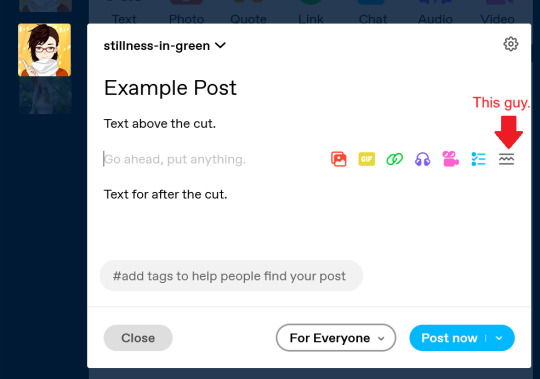
It's the same icon on the mobile post editor, it's just on the far right of the bar of icons along the bottom of the app. My screen cuts it off, so I have to scroll the bar over to find it.
Like I said, the Expand dropdown button Tumblr instituted a little while back has reduced the need for this somewhat, and you can certainly do whatever you prefer, but as I believe having the Expand dropdown automatically clip long posts is still an optional configuration in Settings, I'd feel better about reblogging from you directly if you put the bulk of your reply under a cut.
Don’t know what “blorbo” means. Kinda sounds like a demeaning term, but I’m going to assume it’s not.
Sorry, it’s not intended to be demeaning! It’s just a slangy affectionate term for “character you really like.” In my experience, I’d say it also has a connotation of protectiveness or self-identification, though I can’t speak for the whole of the internet. I like plenty of characters, but I wouldn’t call them all my blorbos, just the ones that I really and truly love and want to explore/share/defend their honor to the death.
Thanks...? Is, is that a compliment?
(Re: my telling rvg that we seemed to have similar issues with the way Mina was being handled, but they were more willing to do the mental legwork on her than me.)
It’s mostly just an observation, but not a critical one! As someone who’s very ready to read into the canon every little drip of information the canon will give me And So Much More, I have a tremendous amount of fellow-feeling for people of like minds, even if our taste in characters is different.
Buried At The Bottom, Why Kaminari Is A Worse Character Than Mineta, Yes I Said It And I’ll Say It Again
>>I have observably positive feelings for about a third of Class 1-A and only particularly negative feelings about Deku and Kaminari.
What’s up with Kaminari?
My irritation with Kaminari boils down to two main things—and forgive me, I know you didn’t ask about Mineta, but Mineta’s pretty important to my feelings on Kaminari being what they are, so he’s a part of this answer. This is all going to be pretty openly dismissive of Kaminari, as a fair warning, on top of being based on not-exactly-rigorous familiarity with the student material, so apologies to anyone who likes him and finds him an enriching, valuable character. But man alive, that is not me. And but so:
1) Kaminari is a watered-down Mineta, with watered-down versions of all of Mineta’s flaws, but because he’s watered down, the growth he experiences stands out less than Mineta’s. More on this in a second.
2) Despite Kaminari being a redundant character who brings virtually nothing to the table that other characters don’t do better—with the only things that are unique to him going underdeveloped in canon—fandom loves Kaminari. (Disclaimer: I obviously don’t spend much time in the hero-fan circles of the fandom, so this is just my perception. I’d be curious to get your perspective of Kaminari’s relative popularity, rvg!)
To hit the second point first, Kaminari has a more conventionally attractive cute anime boy face than Mineta, so Kaminari’s pushing of his female classmates’ boundaries gets mostly ignored, while Mineta gets so many fics written about him dying that there’s a dedicated Dead Mineta Minoru tag on AO3 with almost 350 hits.
Fandom built a whole tottering edifice of fanon about Traitor Kaminari despite the howling absence of compelling evidence in the manga[14] for, so far as I can tell, the sole reason that people wanted the cute anime boy to have crunchy angst. Then, when the actual traitor reveals landed (first the fake-out and then the real one), fandom deemed Hagakure an ungrateful bitch and Aoyama a whining coward.
So like, the fandom discrepancy is what pushes me over the edge from the bottom end of neutral into active dislike. But I would be awfully close to it anyway for the whole “redundant-ass character who contributes nothing to this story we couldn’t get better from someone else” thing.
Kaminari being kind of leery and unpleasant about his female classmates would be a lot more glaring if it weren’t stacked up against Mineta’s actual sexual harassment, even though Kaminari is a frequent co-conspirator!
Kaminari has a brief tussle with fear at the beginning of the war arc, but it’s neither as sustained nor as convincing as Mineta’s frequent wrestling with cowardice, present from USJ all the way up through his terrified confrontation with All For One.
Mineta is frequently, openly envious of his classmates, a whole extra flaw that Kaminari never demonstrates in more than fleeting glimpses.
Kaminari’s quirk is redundant next to the other high offense types in the class.
Kaminari’s personality is not distinct enough to add anything irreplaceable to the classroom dynamic. That’s not to say he brings nothing to the web of relationships amongst the students or the ways the class as a whole reacts to the events of the series, just that what comes to mind for me is mostly extra layering to existing dynamics, not anything truly original and unique to him. Which would be fine—I love extra layers!—if he were contributing more as a character on literally any other fronts.
I can think of only two things that Kaminari uniquely brings to the table, but both of them are mentioned once and then never come up again. Firstly, he’s the only one in the class to voice open admiration for Stain, a willingness to admire cool traits in Villains that never leads him to any interesting conflicts with people (classmates or otherwise) who hew to the more standard flat refusal to consider that a Villain might have or express positive aspects.
The other thing is less about Kaminari himself and more about how he’s one of three places where the story brings up the idea of people using their quirks for non-hero jobs and then refuses to develop that premise.[15] It’s interesting worldbuilding, but as far as I’m aware, it’s never directly shown—everyone we see using their quirks (legally) in the series is doing it as a hero. We never get much sense of what other options there are for quirk use because heroism and villainy are the only contexts we ever see it in! This would be a little annoying on its own, but I also find it undermines a lot of other established facts and characterizations.
(Bear with me and I promise I’ll loop this back around to Kaminari.)
My interests being where they are, the biggest problem for me with the fuzziness about the legality of quirk use is that it leaves Destro and the MLA with no coherent cause. They want free quirk use, but are they really so incredibly averse to just getting a license that they’re willing to become terrorists over it??
You could argue that naked quirk supremacy is what the MLA is currently after, and that’s obviously incompatible with the laws as they stand, but Destro Classic is never really framed as a quirk supremacist, so why did he so virulently despise the quirk use prohibitions if all they really did was require people to get a license to use quirks in public, no different than a driver’s license or a permit to serve alcohol? Sure, you get small clutches of people sometimes with that kind of “any government oversight is bad government oversight” black-and-white thinking, but the original MLA was a powerful enough force to stand against the government for years, which doesn’t exactly scream “a handful of malcontents” to me.
Rendering the MLA’s cause mindbogglingly asinine is my biggest problem with the “other jobs can get quirk-use licenses too” tidbit, but there are also things like how totally invisible the entertainment or sports industry is. That would make perfect sense if quirk use is illegal in those fields—people want to see cool superpowers getting used, so industries that bank on public attention dollars but can’t have their celebrities use their quirks are going to decline when they can’t compete with industries/celebrities that can.
If quirk licenses can be gotten for all sorts of jobs, though, then why have sports and entertainment become so invisible? If “frivolous” fields like those are not aren’t seen as “contributing to society” enough for quirk use permits, then which fields do? Why does HeroAca!Japan still mostly look and behave like IRL!Japan if quirks are in use in “all manner” of industries? And if it isn’t the case that heroism—a dangerous job which sometimes gets people killed and which generally requires cultivating a socially demanding public brand/identity—is the only path to being able to use the special power you were born with to earn a livelihood, why does every single middle-schooler in Deku’s class and countless other classes across the country want to become a hero?
I just feel like the way the world looks and operates, the kinds of repressiveness described by even the heroes, the structures that drive people into heroism and villainy alike—the former because they don’t see any other viable way to achieve the happiness they’re looking for, the latter because they can’t become heroes but still have desires that their quirks could help them achieve—all of that makes much more sense in a world that has super powers but has tightly restricted their use to a single job class of person.
So, tying back, obviously that’s not a fault of Kaminari’s, but he is the character where that gap is most apparent. If there aren’t many lightning heroes because lightning is in high demand in other industries, it would shed significant light on who Kaminari is as a person if the manga would tell us what those other industries are.
What other paths could Kaminari have chosen? What’s so much better about those other industries that people with quirks tailor-made for heroism,[16] in a society that worships popular and powerful heroes, are so willing to choose those other industries instead? Why did Kaminari not make that same decision? What does heroism mean to him personally that he chose it when so many others in his situation did not?
Kaminari could present a huge in on that angle of the worldbuilding, but instead he’s a complete dead-end. Mineta’s motivations are base as hell, but at least we know what they are! Further, it tells us interesting (uncomplimentary, but interesting!) things that people like Recovery Girl and Deku hear said motivations from Mineta’s own mouth, and shrug and accept them as perfectly valid.
And that’s just his professed motivations! His final exam scene actually drops an early hint about the admiration for Deku he’ll later wholeheartedly declare in the 1-A vs Deku fight! I don’t remember Kaminari ever getting anything a fraction so revealing; he just coasts through the story contributing nothing unique or meaningful. He’s hardly the only 1-A character with that particular lack of depth—Sato, Sero, Hagakure and Ojiro are all similar blank slates in terms of their motivations or histories—but then, none of them are a fraction as popular as Kaminari is in the fandom as I experience it, either.
So to sum up, I dislike Kaminari because he’s a wishy-washy nothing of a character, a generically Inoffensive Anime Cutie Boy adored out of all reasonable proportion compared to more compelling and equally underdeveloped classmates alike. Mineta is, by any measure, more problematic, and it's even worse that U.A./Aizawa are so blasé about him, but, at least from where I’m standing, he’s still more layered, more compelling, more dynamic, and speaks in more interesting ways to the world around him than Kaminari ever comes close to matching.
(…Kaminari’s thing with Jirou is fine. Perfectly reasonable character relationship building material. I just don’t count it one way or the other because it’s a self-contained relationship dynamic that has no bearing on the way either character engages with the broader world/system the series’ overarching narrative is challenging. They motivate each other in small ways, but that motivation doesn’t lead them to truly grow or change as people, only to overcome modest internal confidence hurdles blocking them from things they already wanted to do anyway.)
--
And that's it! Thanks for forging through, good lord, over twenty pages of this, rvg and anyone else who did! I hope you were at least moderately entertained, give or take my blatant Kaminari slander. See you next time, and enjoy the Footnotes.
----------------
FOOTNOTES
----------------
[1] We’re not shown any personnel or drugs or anything, but I assume they’ve been keeping Machia drugged since Jakku, same as Kurogiri in between interviews. It’s the only thing that worked on Machia before, so why wouldn’t they have more on-hand?
[2] Despite watching the Sports Festival with Shigaraki, natch.
[3] I would like it if he would do that with a lot less insufferable power scaling bullshit, you understand, but I’m spotting the comic its plot arc here.
[4] Outside of, say, the Persona games, where the MCs can change ability sets by swapping out what companion spirit they’re packing, but even that doesn’t make them specialized for status effects, merely capable of using them.
[5] Interestingly, while Bakugou fought off the villainous sales pitch with as much verve as he brings to all his fights, if he had fallen off the righteous path there, we might have observed that his pridefulness was explicitly fostered by the people around him giving him excessive praise for his powerful quirk and ignoring his resulting violent arrogance. That is to say, Bakugou would have fallen under the same, “Villains are created by the failures in their society,” pattern that BNHA applies to all of its sympathetic villains.
[6] There was one other instance, but iirc it was an error in the translation C.Cook had done for the BNHA databook. It would not surprise me that he was being less careful or was more pressed for time when translating the reams upon reams of text in one of those.
[7] At least until the fifteen-thousand-strong mob shows up.
[8] Which frankly should be all he’s sore about. As others have pointed out, Machia’s anger about being abandoned is kind of incoherent. Yes, AFO left him on the battlefield, but he didn’t exactly leave him to rot in prison forever. The moment AFO made his big push, he sent people to spring Machia, so in what sense exactly does Machia think AFO abandoned him? If it was just the last straw after a string of abandonments from both AFO and Shigaraki, the manga could have stood to make that much clearer.
[9] AFO and Ujiko created Kurogiri out of Shirakumo—as a babysitter for Tomura, yes, but Tomura didn’t choose that. And as to Shigaraki’s very existence trampling on Nana’s memory and causing All Might pain, well, Shigaraki didn’t ask to be brought into the world, abused by his father, neglected by his family, and then raised by a supervillain, did he?
[10] And speaking of Unbreakable, compare how explicitly we’re shown Kirishima’s growth and the foundations of it with how the inspirations for Mina’s attacks are relegated to passing mentions, not direct depictions. She just casually tells Kirishima that his Unbreakable inspired her Acidman, and likewise only internally reflects on asking Bakugou and Todoroki to teach her their training method, which let her develop her Max Power Acidman Alma move, without so much as a single scrubbed in doodle depicting said training assistance.
[11] Somehow. The story is unclear on whether he disseminated threats, contacted them directly, or just used the combination of Search+Warping to drag them all back into his presence, and that last option in particular runs into complications given the limitations of both quirks.
[12] In this AU, we would have gotten to see the class have an actual discussion about Saving Villains, prompted by the way the reveal about Aoyama solidified Deku, Shouto and Uraraka’s desires to help their respective villain foils. The class would carry that resolve forward not only for those three villains alone, but also Shouji for Spinner, Kirishima when talking to Hose Face, Mina, here, with Gigantomachia, etc.
[13] None of the things I can think of that might be considered evidence of protest meet all the criteria. The original MLA became violent, Harima Oji was a lawbreaker and also ineffective in the long term, the small group that yells at Endeavor and the rest in Chapter 311 is not portrayed as linked to any broader efforts to unseat “fake heroes,” and the group that “condemned” the newscaster Miyagi Daikaku was ineffective and didn’t even seem to rise to the level of open protest.
[14] "His grades are poor but he namedrops a Hemingway novel! He must be concealing the fact that he's actually super-smart!" "He's doing a Liberation salute! He must be the traitor, even though the Liberation salute uses the other hand, and Kaminari has been using finger-gun gestures to fire off his lightning attacks since at least the License Exam if not earlier, and the League had no connection to the MLA at the time when the traitor was most active!"
[15] A blurb about Kaminari in, iirc, one of the volume extras, Suneater’s flashback to a teacher telling his class that they can “make fine use of their quirks at any number of jobs,” and Uraraka’s early mention that she’d considered “getting permission” to use her quirk to help with her parents’ construction business.
[16] See the previous discussion about the kinds of quirks that are popularly accepted as “good hero quirks.”
#bnha#stillness answers#-ish#my writing#pink alien on parade#plf advisors#grape expectations#bnha minoru#gigantomachia#plf arrests#heteromorph discrimination plot#horikoshi stop ignoring the villains' perception quirks challenge#hero society#bnha critical#ethics of heroism#bnha endgame#double-duty brainstorming for the rewrite AUs#randomvongenerico
30 notes
·
View notes
Note
Did Touya ever want to be a hero or was that something Endeavor pushed onto him? We know what Touya wants now and even if he reconciles with his family, what's there for him after that? Maybe I'm thinking too far into the future but it's sad cause his life is kind of ruined. He can't be a hero like Shouto (if there is a society for that afterwards) but if it's just to live peacefully with his family and get the rehabilitation he needs then that in itself is nice but he's like, the only villain I can't think of a future for so it's what worries me that he'll get a redemption through death after some big family reunion
I want to address your first question because that’s something that really irks me fandom. I see often the take that Touya didn’t really want to be a hero because clearly he was after Endeavor’s attention as if this reason would invalidate his goal. While it’s true that Touya’s primary goal is getting back his father’s attention, the underlying cause is a lack of identity.
Being a hero in the story is not just a profession, but a broader search for positive identity and goal and a way of interacting with the world. That’s why even characters who have spent many years as pro heroes like All Might or Endeavor still have an ever-changing view about what a hero is and what it really means.
If you look at Izuku’s story, that overwhelming desire for affirmation that he too can be a hero is the enabler of his journey. And conversely, if you look at the villains, it’s a common thread in their childhood that they were told they couldn’t be heroes. A part of their identity has been locked away from them pushing them into the opposite direction.
So even if Touya’s reason to want to be a hero is linked to his father - being told he can’t be shut down that route to self discovery that we see the hero kids embark on. None of them have the exact same reasons to want to be a hero than they did as kids. Their understanding of what being a hero means also changed drastically.
But it was still crucial for their journey that their ability to imagine themselves as heroes was never shut down. So I feel like beyond the general pain of paternal rejection, Touya being denied in this specific manner, in this specific part of his self-image is significant.
And this is what I think what the final arc will / can do when it comes to saving the villains. Reconnecting them to this positive part of every child’s identity - the ability to see themselves as heroes and how that affects their growth as a person. I think once Touya is able to reconnect to a positive image, options for his future will also open up.
It’s the Todoroki theme - only he can affirm the reason for his birth, but until he is capable to see himself as something other than a reject/ failure, he won’t be able to unlock those paths.
49 notes
·
View notes
Text
Oh goodness. God fucking damn it. AFO is back and about to claim that he's the one behind everything bad in Tomura's whole life.
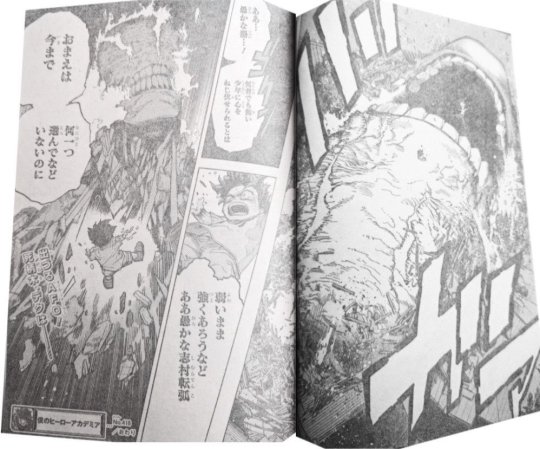
GO AWAY YOU SELF-IMPORTANT CRINGELORD THIS STORY IS NOT ABOUT JUST YOU! Or, apparently it is! Because it looks like we're going to get the reveal that he truly was the one who gave Tenko Decay and manipulated the people around Tenko to ensure the tragedy of the Shimuras.
No doubt we will only logically then get the reveal that he gave Eri her quirk as well, since she has near all the same signs of just having a random mutation quirk as Tenko, and the moral of this plotline we are learning is that there is no random tragedy. And of course we'll also learn he killed Endeavor's dad, gave Toga her quirk, invented the modern day anti-heteromorph rhetoric, and also capitalism, that he was the guy who jumped in front of Jin's bike, and even that he's actually causing the quirk singularity apocalypse. How dastardly he is for all that; but the good news is that it'll mean that once he's gone for good for real this time, Crime & Conflict Will Be No More! YAY!
At least I sure hope so for the sake of the MHA-verse, because the world is looking pretty doomed otherwise. Tomura, The only character who cared about addressing all of that and might've gotten Deku to care about addressing all of that, is looking set to get revealed to be No-Agency-Man who it turns out was manipulated by AFO in his every thought and action this whole time. Who's gonna listen to that guy's opinions, those AFO-by-proxy opinions, on systemic inequality & corruption? Certainly not Deku; he gets to go on thinking the world All Might built is perfect outside of those dastardly AFO-like villains.
This, fyi, is the main reason I so adamantly opposed the 'AFO gave Tenko Decay' reveal; this 'Today is saved Tomorrow can go fuck itself' ending it leads to where our Tomura gets saved but the next Tenko is screwed, as is society as a whole when they become a new Tomura, form a new League, and it all gets set on a loop. (I mean unless AFO really is behind literally everything, then that's a different problem.)
God I hate this development. Please Horikoshi, veer away before it's too late.
#bnha#bnha 418#bnha spoilers#all for one#shigaraki tomura#shimura tenko#eri#dabi#endeavor#toga himiko#spinner#twice#jin bubaigawara#mr. compress#midoriya izuku#all might#league of villains#lov#paranormal liberation front#PLF#class 1a#hero society
110 notes
·
View notes
Text
So.....am I the only one who thinks the whole recent arc isn't the first time that AFO is exploiting the heteromorphs? I mean look at the guys he took quirks from at chapter 193


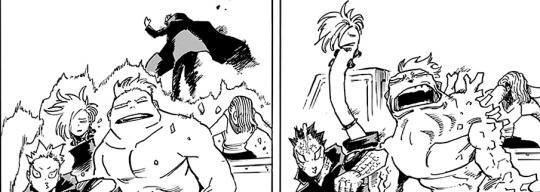
The way the quirk Cloud was changed to form a mist, making Kurogiri look even more like a heteromorph as well as masking him (none of his loved ones recognized him as Oboro ;^;)
It might be intentional imo
The heteromorphs seem to be the most vulnerable to him and his offers for any protection, since most wouldn't treat them as humans And as we have seen with Tomura and Yoichi, AFO schemes rely on no one helping his victims
So he knows best how to work with them based on society’s prejudice against this group of quirk holders
32 notes
·
View notes
Text
Will Deku shred the Rug?

This ☝️ is amazing if that's really his intent now.
But I am personally not sure if Deku means this exactly because (while powerful) the words are still pretty vague.
Deku doesn't really know shigaraki that well yet and while maybe their vestige/mind link will lead to him finding out more through memory vision (which would be really cool), I can't help but wonder if deku really knows what "shredding the Rug" actually means here?
Because the "Rug" shigaraki is talking about is hero society as a whole.
Hero society can't exist as it is without the rejection and persecution of the "villains" in it, because while there are many villains who are that way just because they like it, a little less than half of all the antagonists in bnha have been shown to be made that way because of hero society's faults.
So if like, almost half of the villains in an already "oversaturated with Heroes" society, never become villains in the first place, what happens then?
Logically it can't sustain itself.
It can only change radically to adapt or collapse and end.
The problem is: no one else besides ochako and Deku have been shown to want either of those things.
That could change later (maybe with shoto or other heroes), but the point is that even just changing the hero system that much, means the end of their current way of life.
And many heroes and the people who profit off of them would definitely fight against that happening.
Heroes who got into it for the fame and money, companies who use heroes for advertising/marketing, and the government itself with the hero rankings and influence.
Without the villains (in a sustainable number), it would all be downgraded or disappear.
Hero society has never accepted those who went against the flow in anyway from the beginning.
And all of this without even touching on how the Civilians will react. (Based on evidence, extremely not well.)
So if the notion of Deku shredding the Rug is serious and how it's implied, then it can only really mean:
Deku shredding Hero Society.
Which would be awesome 🔥
(if that's really how it was meant)
45 notes
·
View notes
Text
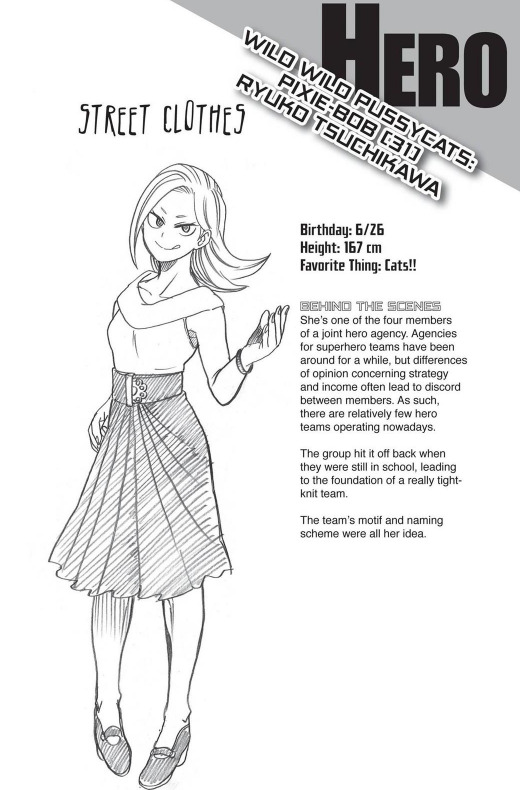
There's an interesting tidbit of worldbuilding in Pixie Bob's character page: hero teams are a rarity. So the hero industry has become a series of one man shows and their employees rather than heroes working together to resolve problems.
Just differences in strategy and income doesn't explain this trend though. A hero, sidekicks, and other employees at the same agency could have the same problem.
This trend is also likely due to All Might as well as the Hero Commission. All Might set the standard for the one man show hero agency. On top of that, he takes the urgency out of much of the hero industry because he was always there to be the fallback guy if things went wrong. And if there isn't much urgency, then much of the income from heroics is going to rely on establishing a brand. And having a brand that stands out would be more difficult in a team of hero equals.
And the Hero Commission likely exacerbated this trend because they would probably do anything to prevent heroes from doing the in universe version of collective bargaining.
#bnha reread#bnha 70#bnha#pixie bob#tsuchikawa ryuko#hero society#all might#it bothers me that her hero name is pixie bob when she has neither a pixie nor a bob haircut#feeling old bc i realize i dress like her nowadays
46 notes
·
View notes
Note
Why villain stans so determined to hold the league of villains as leftist revolutionaries and fucking infants thst can't handle consequences at the same time?
I mean, if you are talking about fans seeing their faves as 'baby' is a thing for everyone. Not just for villain stans or hero stans, its a thing for everyone. The reason is i think seeing character's whole life is like watching your own child to growing slowly so it makes sense (though i saw really horrible irredeemable characters being treated as baby too).
Well, coming to your question, anon.
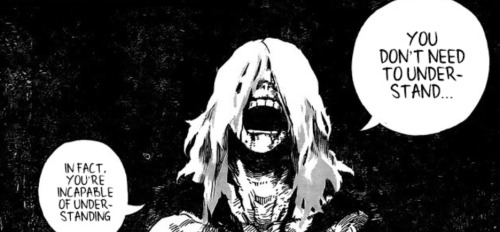
People see league of villains leftist revolutionaries because thats literally the plot. Bnha is all about how messed up hero society is, it has flaws and heroes 1- they dont do anything about it 2- most of them dont even see anything wrong with it.
Every member of league of villains is victim of that messed up system and they are rebelling against it. Of course, obiviously, their way of rebelling is wrong but in the end, they are the only characters who ciricitize the system and calling heroes out for it. Its no coincidence either. Actually i remember someone making a post about it, how league of members resemble outcasts of the Japan, that people who are being left behind for no reason and how people are forced to be 'normal', i think in a way author is criticising his own country (maybe wold)'s abusive system with its victims.
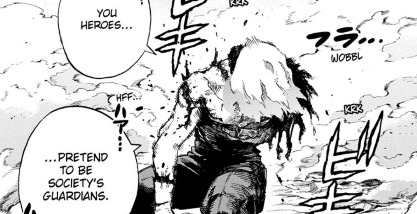
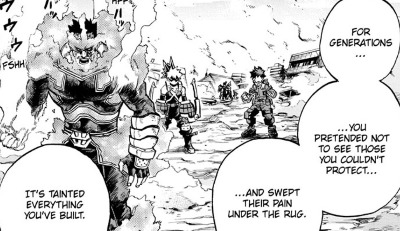
Also in this story, victims are also villains, i think its also clear that author try to show that even good people can turn into monsters, if they dont get help. That 'good-bad victim' mentality is wrong and unrealistic. You can even say author is criticizing that kind of mindset in a way.
Basically i think thats the point of story and i am really glad that author write his story like this.

And i dont think 'villains stans' see villains as babies who cant handle consequences, its less about that, its more about empathizing their situtions and mental states. I mean, we are talking about victims who never get help, especially villain trio, Shigaraki doesnt really understood or more like accept what happenned to him, Toga doesnt really understand why people dont like her, Dabi doesnt even plan to survive, like, think about it.
In Toga and Shigaraki's case, narrative literally called them as 'child' for a reason.
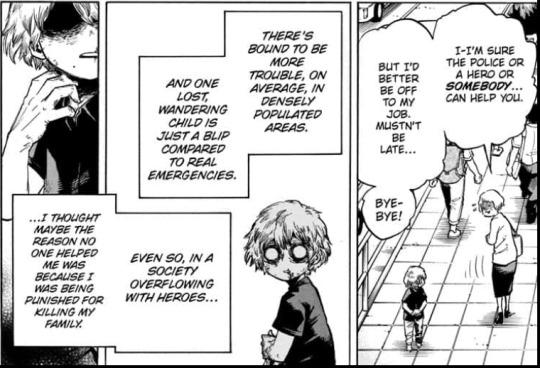
All those tragedies happenned to them when they were just little kids and from that point, they never really get help, they never had someone reach out to them, they never had a chance to really/heathy way to adress what happen to them, they wre conctsnatly shut down by society and treated as monsters, treated as they are at fault for being in this sisution at first place. Basically 'victim blaming'. Of course, in this sitution, they didnt emotionally grow either. Yes, they are not children but they are not adults either because people dont grow, if they are isolated from the world and reality, especially traumatized people. Also from their position it makes sense why they couldnt and cant see conseuquences of their actions.

Btw, i think the one who cant really handle consquences are heroes/proheroes more than villains. Most villains know how their actions backfire to them but heroes are like they will kill and it will be justice, they will lash out for no reason but people will praise, they will be more violent than they need to be but they will still seen as 'heroes'. They are not 'oh so pure' characters. Both villains and heroes are gray people. I think story also pointed that the only real differences between villains and heroes are popularity (in vigilantes). We saw that there is not a single red line between them, there is just tiny line between them and it can eaisley switch depends on their situtions, thats the teryfing part of hero society' system and all story is about changing it.
(I hope you got me, anon, i think i got this question before, this is second one so weird but whatever.)
95 notes
·
View notes